“ in the spirit of the Magis”


“ in the spirit of the Magis”

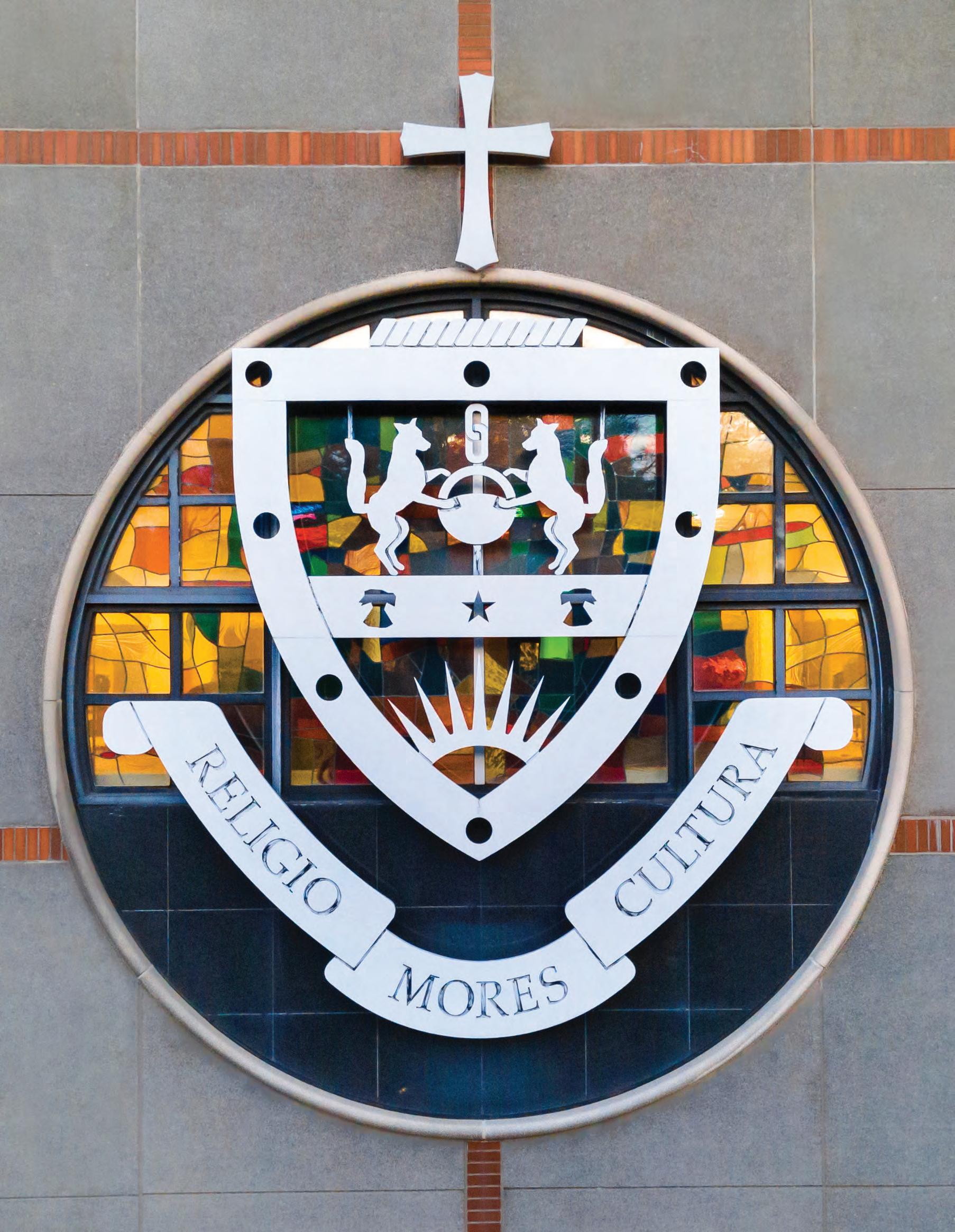
EDITOR
Kristie G. Ceruti
DESIGNERS
Vikki Lawhon
Jason Thorne G’13
CONTRIBUTING EDITORS
Joseph Fitzhenry
Tom Salitsky
Stan M. Zygmunt ’84, G’95
ASSOCIATE WRITERS
Josh McAuliffe
Trish Shea
ASSISTANT CLASS NOTES EDITOR
Margery Gleason
PHOTOGRAPHY
Grace Crowley ’23
Timmy Drewes
Christine Kozak
Byron Maldonado
Meg Sweeney ’20
PRESIDENT
Rev. Joseph G. Marina, S.J.
SENIOR VICE PRESIDENT FOR THE OFFICE OF THE PRESIDENT
Gerald C. Zaboski ’87, G’95
VICE PRESIDENT FOR UNIVERSITY ADVANCEMENT
Robert W. Davis, Jr., Ed.D. ’03
DIRECTOR OF MARKETING COMMUNICATIONS
Lori J. Nidoh ’80, G’89
DIRECTOR OF CREATIVE & PRODUCTION SERVICES
Colleen Carter
The Scranton Journal is published by The University of Scranton for its alumni and friends. External Affairs Office
The University of Scranton, Scranton, PA 18510-4615
Email: scrantonjournal@scranton.edu Office of Alumni Engagement
The University of Scranton, Scranton, PA 18510-4624 570.941.5997. Email: alumni@scranton.edu Website: scranton.edu/alumni
If this issue is addressed to a graduate who no longer maintains a residence at your home, please tear off the mailing panel and mail it, with the corrected address, to the Office of Alumni Engagement.
The University of Scranton is a Catholic, Jesuit educational institution serving men and women. © 2024 The University of Scranton
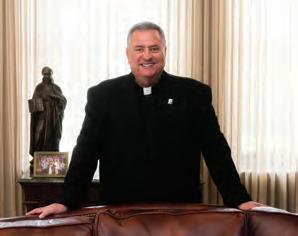
Dear Friends:
St. Ignatius tells us “Love is shown more in deeds than in words.” Our fall issue of The Scranton Journal examines this Jesuit axiom at work across the nation and throughout our University community.
Read about the commitment of our alumni far and near who lead with knowledge and devotion to advance the corporal welfare of others. In this issue, they outline their pathways to high-level roles within health care administration that began with the University’s academic programs and the mentoring they received at Scranton.
Another feature close to home celebrates three years of excellence and determination from our Prison Education Program’s first cohort of graduates. The faculty involved model respect for the uniqueness of each member of the University community and, in doing so, remind nine incarcerated students of their value in the world.
In the pages ahead, you will meet Robert S. ’68 and Marilyn A. Weiss, who give freely of themselves to make a transformational investment in current and future Royals; Jimmy Lynett ’97, who creates magical customer experiences on multiple continents; and Gene Manning ’71, whose philanthropy ensures that Scranton students will benefit from the same Jesuit education he received more than half a century ago.
This issue would not be complete without recognizing our Philosophy Department, which places the University among the best in the nation for enrollment of women in top-tier doctorate programs. These high-achieving Royals and the professors who have supported them along the way share their SJLA formula for success in the pages that follow.
As we enter a new academic year, let’s keep gratitude as a central focus. Please continue to remember the University in your prayers and be assured of mine in return. GO ROYALS!!
Yours Faithfully,

Rev. Joseph G. Marina, S.J. President
First cohort graduates, faculty and founder offer perspective on The University of Scranton’s pioneering Prison Education Program.
While only 32 percent of philosophy bachelor’s degrees are awarded to women nationally, Scranton retains a remarkable 60 percent female enrollment in its philosophy major, with most who decide to pursue graduate study in philosophy securing placement in fully funded Ph.D. programs.
C-suite leaders in health administration outline their career pathways and the mentorship, academic programs and Jesuit foundation that enable them to answer the call.


There is more Scranton news than we can fit in this print edition! Look for icons throughout The Scranton Journal indicating more related content, including photographs, videos or expanded articles, on our website. Visit scranton.edu/scrantonjournal to read the online version of the magazine, and visit scranton.edu/journalextras to access our web exclusives.

Find out from alumni how the Special Jesuit Liberal Arts program provides students with an ‘incredible connection’ at scranton.edu/journalextras
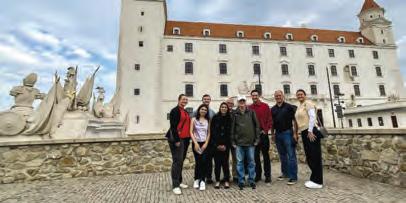
Discover study abroad opportunities for residential and online students in the Master of Health Administration (MHA) program at scranton.edu/journalextras

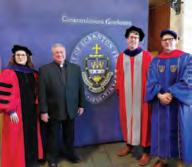

The ‘Buzz’ on Providing the Royal Treatment
Jimmy Lynett ’97 shares hidden gems among Disney Cruise Line destinations at scranton.edu/journalextras


By the time this article publishes, the University will be less than one year from welcoming visitors to Robert S. and Marilyn A. Weiss Hall, a new center for workforce development, applied research and outreach that is currently under construction in the 300 block of Madison Avenue on campus.
Earlier this year, on April 8, the University broke ground on the four-story, roughly 90,000 square-foot building designed for innovative collaborations between the University and the greater Scranton community. Two months later, Rev. Joseph G. Marina, S.J., president of The University of Scranton, announced that the building would be named Robert S. ’68 and Marilyn A. Weiss Hall, in honor of the longtime University benefactors. Their $10.5 million gift is the largest single donation in the school’s 136-year history.
“Future generations of students will fill the classrooms of Weiss Hall and learn brilliantly from our faculty. They will use the wellness services that this building houses, the innovative makerspace and, of course, the beautiful prayer garden,” said
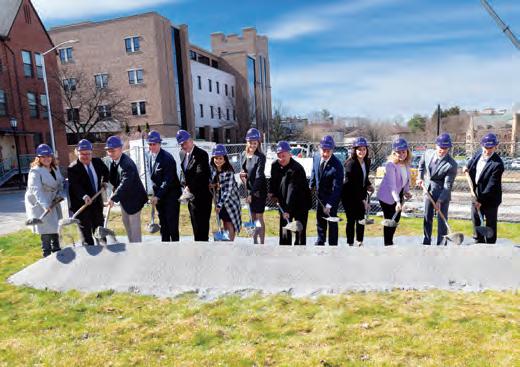
Father Marina at the building naming announcement. “Exciting new research by students and faculty will happen under its roof. And, good people from around the Scranton community will be invited into Weiss Hall to benefit from a variety of services and experiences to be offered.”
In addition to the innovation hub, the University’s Center for Health Education and Wellness and the Small Business Development Center, Weiss Hall will house the University of Success program and laboratories, classrooms, offices and meeting areas for the University’s Department of Criminal Justice, Cybersecurity and Sociology, and the Psychology Department.
The University plans to begin use of the building, designed by Hemmler and Camayd (HC Architects), for the fall 2025 semester.
Although Robert S. ’68 and Marilyn A. Weiss left Scranton decades ago, Scranton never left their hearts; learn how their $10.5 million gift to the University will help transform the hearts and minds of future Royals. See page 38.

The University of Scranton renamed its Commons the “Rev. J.A. Panuska, S.J., Commons” and its Faculty/Student Research Program the “Rev. J.A. Panuska, S.J., Faculty/ Student Research Program,” in honor of its longest-serving President, Rev. J.A. Panuska, S.J., H’74; and renamed the Panuska College of Professional Studies the “Leahy College of Health Sciences,” in honor of longtime University benefactors Edward ’68, H’01 and Patricia Leahy, and their son, Edward, Jr.
“Father Panuska’s devotion to students was legendary, as was the University’s growth under his leadership, and few if any Scranton graduates and benefactors can match the lifelong devotion that Ed Leahy and his wife, Patricia, have manifested over the decades,” said Father Marina.
Father Marina also noted that changing the title from “professional studies” to “health sciences” more accurately describes the mission and scope of the school, which offers degrees in physical and occupational therapy, nursing, healthcare administration, kinesiology and counseling.
“During his 16-year tenure as President, Father Panuska is credited not only with a construction boom that added 15 buildings to the campus, but also for raising the caliber of our faculty from excellent teachers to teacher-scholars,”

said Father Marina, explaining the rationale to remember and honor Father Panuska with the renaming of the Faculty/ Student Research Program as well as the Commons, the stone pathway at the heart of campus that begins on Linden Street and Monroe Avenue and continues to North Webster Avenue. Three artworks, commissioned during Father Panuska’s term as President, adorn the pathway: the sculpture of Christ the Teacher at the base of the Commons; the Metanoia of St. Ignatius at the midpoint; and the statue of Jacob and the Angel at the top of the hill on the Commons.
Rev. William J. Byron, S.J., H’84, the 21st president of The University of Scranton, passed away Tuesday, April 9 in Philadelphia at the age of 96.
Father Byron served as president at Scranton from 1975 to 1982. During his tenure, the University’s operating budget doubled, while at the same time a computer-based Management Information System ensured each year’s budget produced a surplus. Father Byron embarked upon a multimillion-dollar capital campaign for the school. A new undergraduate college, the School of Management, was created, along with new programs including nursing and physical therapy. While no new buildings were constructed, the University’s physical plant continued to grow with the purchase of several existing structures. Also, two blocks of Linden Street were closed to vehicular traffic, allowing for the University’s “Commons” walkway to begin.
Father Marina, in his message to the University community, wrote of a recent visit he had with Father Byron in March, while Father Byron was in hospice care. “As I walked into
his room at the Jesuit infirmary, Father Byron was sitting up in his chair, alert but struggling,” wrote Father Marina. “He managed to ask if I was the President at Scranton now. When I nodded yes, he said ‘take good care of it.’”
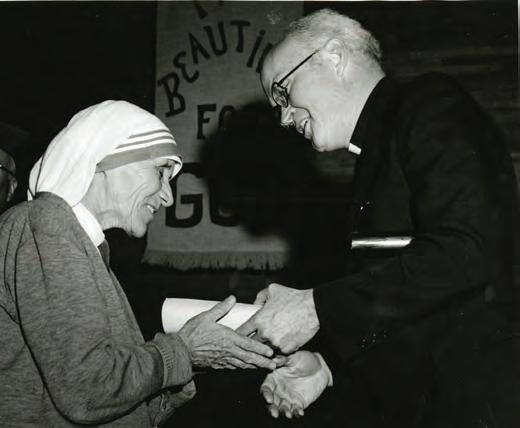

Rev. Joseph M. McShane, S.J., H’04, has been named as the new Superior for the Scranton Jesuit Community. Fr. McShane began his service in Scranton on July 31, 2024. Most recently, he served as a Special Assistant to the President of Canisius University in Buffalo. In 1992, Fr. McShane became the Dean of Fordham College at Rose Hill in Bronx, New York, and held that position until 1998, when he was then appointed the 23rd President of The University of Scranton. In 2003, he was named the 32nd President of Fordham University, a position that he held until his retirement in 2022. He is president emeritus of Fordham.
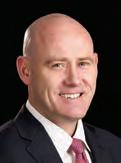


Timothy P. Doyle, has been named senior vice president for finance and administration at The University of Scranton, effective July 1, 2024. He will also serve as a member of the President’s Cabinet.
Susan Russell, M.D., medical director and Maria L. Vital G’11, Ph.D., administrative director, have been tasked with guiding the University and Geisinger Commonwealth School of Medicine (GCSOM) students who will staff the Edward R. Leahy, Jr. Clinic for the Uninsured, which provides free primary care services to local adults. Dr. Russell has spent the past decade as an assistant professor of family medicine at GCSOM while continuing to work as a physician within the Geisinger network. Dr. Vital previously served as the Leahy Clinic’s longtime operations manager until it closed in 2020 at the outset of the COVID-19 pandemic.

Carolyn McNamara Barry, Ph.D., was appointed as dean of the College of Arts and Sciences, effective July 15, 2024. Since 2019, Dr. Barry has served as associate dean for Social Sciences and Graduate Programs at Loyola College of Arts and Sciences, Loyola University Maryland, where she also served as a professor, program director and chair of Loyola’s Department of Psychology.
• Lackawanna College and The University of Scranton have formed more than 30 program articulation agreements, which provide degree-specific pathways to facilitate the credit transfer of Lackawanna College graduates to the University to complete their bachelor’s degrees. Degree pathways established over the past year span all three of Scranton’s colleges and include programs in business, health and other fields.
• The University of Scranton and Xavier School of Management, a Jesuit business school in Jamshedpur, India, have signed an agreement of cooperation that will allow for the future development of exchange programs for faculty, undergraduate and graduate students, as well as possible joint research projects and joint curricular and education programs.
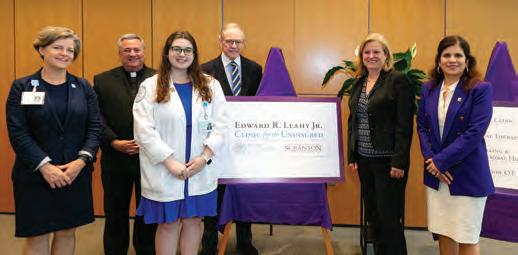
Geisinger Commonwealth School
2023 graduate of The University of Scranton; Edward R. Leahy ’68, H’01, University benefactor; Victoria Castellanos, Ph.D., dean of the Leahy College of Health Sciences, The University of Scranton; and Michelle Maldonado, Ph.D., former provost and senior vice president for academic affairs, The University of Scranton.
The University of Scranton and Geisinger Commonwealth School of Medicine (GCSOM) celebrated the grand reopening of the Edward R. Leahy, Jr. Clinic for the Uninsured and held an open house in the medical and physical therapy (PT) clinic spaces this spring. The Leahy Clinic is the only free clinic in Lackawanna County. Located in the lower level of McGurrin Hall with a Kressler Court entrance, the clinic provides free, non-emergency health care to uninsured Lackawanna County residents who may otherwise forego health care due to cost or seek care in hospital emergency rooms. It expands opportunities for practical experience in patient care, clinic management and other aspects of healthcare for students at both schools.


Elizabeth A. Johnson, C.S.J., the 2024 recipient of The University of Scranton’s Pedro Arrupe, S.J., Award for Distinguished Contributions to Ignatian Mission and Ministry, presented “Jesus and the Earth: Seeing Christ Through an Ecological Lens” at the award ceremony on campus. Sister Johnson, hailed by The National Catholic Reporter as “one of the country’s most prominent and respected
In recognition of Pope Francis’ call toward environmental sustainability, the University’s Sustainability Office chose “Sustainable Living, Caring for Creation” as the theme for this spring’s Earth Day celebration, which included nearly a dozen events such as a daylong Environmental Teach-In, Environmental Art Show and essay contest. The theme was inspired by Pope Francis’ 2015

theologians,” served as president of the Catholic Theological Society of America. She is internationally known for her work in systematic, feminist and ecological theology. The University created the Arrupe Award in 1995 to recognize persons who have furthered in a significant way the Ignatian mission. The award is named for the late Very Rev. Pedro Arrupe, S.J., the 28th Superior General of the Society of Jesus.
encyclical letter “Laudato Si’: On Care for Our Common Home” and The University of Scranton’s commitment to join a coalition of colleges from around the world to develop, implement and evaluate initiatives around seven ecological goals over a seven-year period to meet the Pope’s call for integral ecology and to gain designation by the Vatican as a Laudato Si’ University.

University of Scranton students living off-campus have developed an informal method of reselling or donating furniture to other student apartment dwellers when they move out at graduation. By reusing furniture, they are reducing waste. University students also donate bedding, cloth-
Forty occupational therapy and mechanical engineering students adapted 11 motorized toy vehicles for area children with limited mobility as part of Scranton’s Go Baby Go chapter. The adapted cars were unveiled to the children at a special community event on May 5 in the Byron Recreation Complex.
The students are members of the inaugural chapter of the University’s Go Baby Go, which is a national research, design and community outreach program that provides modified ride-on cars to children with limited mobility. Through the program, the students use readily available, low-cost items to adapt the toy vehicles.
ing, decorations and a host of other smaller items through the End of the Year Drive organized by the Center of Service and Social Justice. This organized effort places donation boxes throughout campus to make it convenient for students to donate, rather than discard, items.

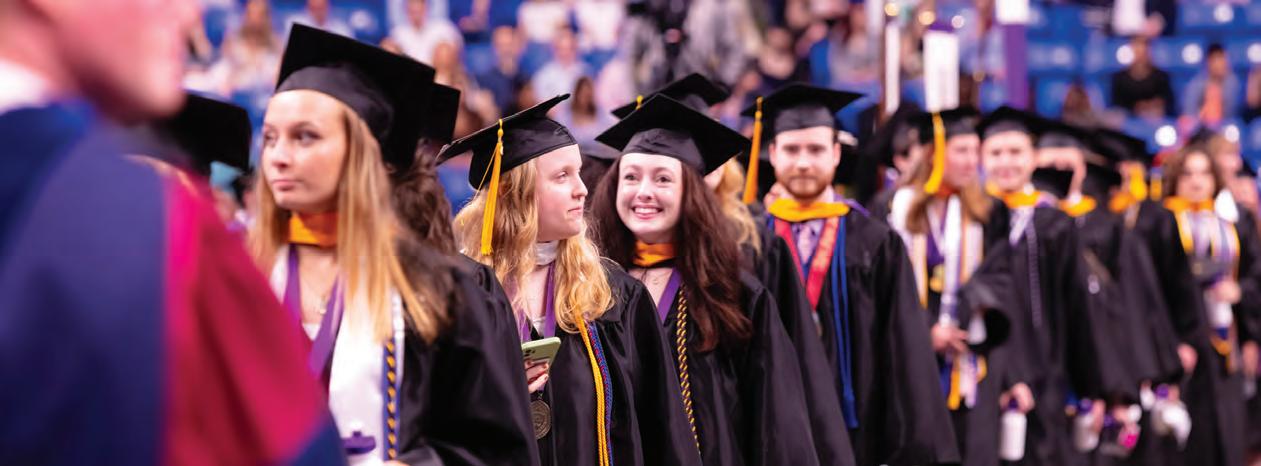
Sunday, May 19 • Mohegan Sun Arena, Wilkes-Barre
Principal Speaker, Undergraduate Ceremony
Shabana Basij-Rasikh, the co-founder and president of the School of Leadership, Afghanistan (SOLA)
Honorary Degree Recipients
Shabana Basij-Rasikh
Sister Mary Persico, IHM, Ed.D., former president of Marywood University
Joseph M. Vaszily ’95, former chair of the University’s Board of Trustees, retired vice president at Goldman Sachs, and referee for Women’s Division I Basketball
Master’s and Doctoral Degree Commencement
Sunday, May 19 • Mohegan Sun Arena, Wilkes-Barre
• Total graduates: > 1,250
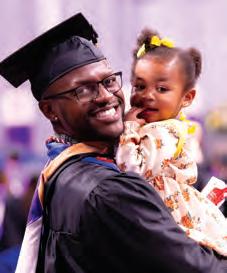
• Total doctoral degrees: > 65 (Ph.D., DPT, DNP)
• Total master’s degrees: > 400
• Total bachelor’s degrees: > 775
• States represented by undergraduates: 17
• States represented by post-baccalaureate graduates: 26
• Top undergraduate programs of study: Nursing, Biology, Accounting, Kinesiology and Occupational Therapy
• Top graduate programs of study: Master of Business Administration, Master of Accountancy, Master of Business Analytics, Master of Occupational Therapy, Master of Health Administration and Doctor of Physical Therapy
• Prestigious scholarships won by Class of 2024 graduates: Fulbright Award in Political Science to the University of Rwanda (The Fulbright is the U.S. government’s premier scholarship program for overseas graduate study, research and teaching).

“You are the curious ones. The thoughtful ones. The fearless ones. … with your knowledge, with compassion and with confidence, lift our world to a better place.”
– Shabana Basij-Rasikh H’24,Principal Speaker,UndergraduateCeremony,cofounderandpresidentoftheSchoolof Leadership,Afghanistan(SOLA).

“The year we started at Scranton, 2020, will never be forgotten by anyone. Our new, budding college experience was overshadowed by serious health, economic and social problems.
… Social interaction was difficult, yet here we are four long-yet-short years later surrounded by friends that will last a lifetime. ….”
– John A. Nelson ’24, Undergraduate Student Speaker
Shelby Traver ’24 and Adrian Laudani ’18 have been awarded competitive Fulbright Student Scholarships, the prestigious international academic exchange opportxunity provided competitively by the U.S. Government. For the 2024-2025 academic year, Traver, Sweet Valley, received a Fulbright Open Study/Research Award to examine the effect of Rwanda’s election quota system

for female candidates. Laudani, Valley Stream, New York, received a Fulbright English Teaching Assistant Award to further develop teaching and mentoring skills in Spain while helping students learning English.
With these two additions, 131 University of Scranton students have been awarded Fulbrights since 1972.


The University recognized outstanding master’s and doctoral degree graduates at its graduate commencement. Outstanding student award recipients from the Leahy College of Health Sciences (formerly the Panuska College of Professional Studies) pictured with Victoria Castellanos, Ph.D., dean of the Leahy College of Health Sciences (standing far right) include, seated, from left: Helen Amanda Wrazien, Pittston; Jennifer E. LaViola, Horseheads, New York; and Marisa D. Tosi, Dallas. Standing: Joseph T. O’Driscoll, Peckville; Kyle J. Yahn, South Abington Township; Nicholas M. Mohr, Milltown, New Jersey; Scarlet J. Alexander, Dupont; Sybil A. Keris, South Abington Township; Jessica L. Opsal, Rockaway, New Jersey; and Elijah J. Emmons, North Abington Township.
Fifty-six members of the undergraduate Class of 2024 were recognized for academic excellence, leadership and service. Students with the highest GPA in each of the University’s three undergraduate colleges were presented with Frank J. O’Hara Awards for General Academic Excellence. Seated, from left, are: Michelle Maldonado, Ph.D., former provost and senior vice president for academic affairs and Rev. Joseph Marina, S.J., president of The University of Scranton. Standing are: Aidan R. Corrigan, O’Hara Award recipient for the Leahy College of Health Sciences (formerly the Panuska College of Professional Studies); Sarah G. Boyle, O’Hara Award recipient for the Kania School of Management; Tabitha R. Berger, O’Hara Award recipient for the College of Arts and Sciences; Madalyne R. Buhler, O’Hara Award recipient for the Kania School of Management; and Charles C. Sylvester, O’Hara Award recipient for the College of Arts and Sciences.
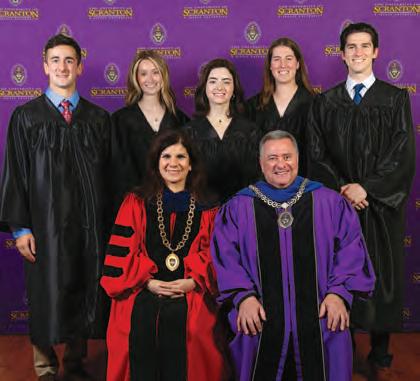

Nearly 70 members of the Class of 2024 participated in the Donning of the Stole Ceremony, a student-led initiative. The purpose of the annual ceremony was to highlight the success of students from historically marginalized identities in overcoming their particular barriers and obstacles faced in attaining a higher education.
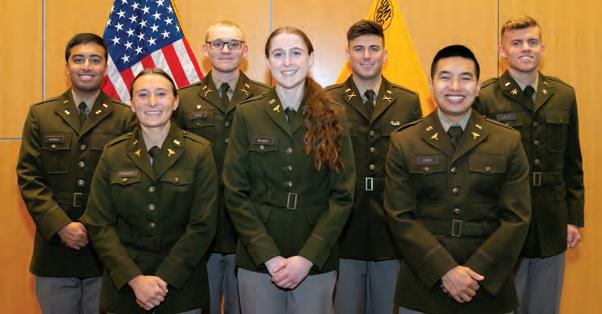
Sarah Boyle ’24, an accounting major from Peckville, scored a perfect 180 on her Law School Admission Test (LSAT), a feat accomplished by less than half of one percent of American Bar Association (ABA) applicants this year. A disciplined student, Boyle spent more than 10 months preparing for the standardized test that is used for admission to law schools.

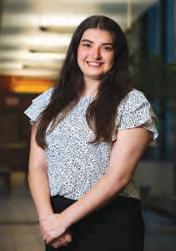
A Newsweek story about Boyle’s perfect score stated: “just 123 of more than 49,000 ABA applicants this year achieved a 180 score in the admission test, according to the Law School Admission Council.”
University students Sarah Boyle ’24 and Annalisa Mechanick ’23, G’24 were among the four students in the world selected for the Institute of Management Accountants’ (IMA) 20232024 “Jimmie Smith” Student Leadership Experience. They are the fifth and sixth Scranton students to participate in this highly selective program.
Seven cadets were commissioned as second lieutenants in the U.S. Army. Pictured, front row, from left, are: 2nd Lt. Jenna L. Leonhardt; 2nd Lt. Allison N. Palmer; and 2nd Lt. Joseph X. Lynch. Second row: 2nd Lt. Jay H. Kapadia; 2nd Lt. Aidan T. Szabo; 2nd Lt. Gary G. Geinitz; and 2nd Lt. Ryan V. Lally 2nd Lt. Lally earned Distinguished Military Graduate status by the U.S. Army, which designates placement in the top 20 percent of Army ROTC graduates in the nation for this academic year and in the top 10 percent in the country.

A team of University of Scranton students earned Honorable Mention and two students received individual “Best of” awards at the American Mock Trial Association Regional Competition, which took place at American University, in Washington, D.C., in February. The Scranton students competed with teams from Yale, Fordham, Swarthmore, American and Catholic University of America, among other colleges and universities. Amanda J. Karpiak, a history major from Scranton, and Emilia R. Tobey, a criminal justice major from Scotch Plains, New Jersey, won Best Witness awards.
Mitchell W. Sporing ’24, Mount Ephraim, New Jersey, has committed to a year-long, post-graduation service project offered through the Jesuit Volunteer Corps Northwest that will take him to Juneau, Alaska. Sporing was recognized at the Baccalaureate Mass.


Louis Stanley Brown Hall received a flourish of the University’s signature purple with the March 26 installation of a new canopy and awning. The first phase of updates to the building at 600 Linden Street began last fall with an addition of digital window pictures on the building’s first floor exterior.

Ten University of Scranton students and one alumnus presented their work at the Sigma Tau Delta International Convention in St. Louis, Missouri in April. Four won awards for work they presented at the conference: Bethany Belkowski ’24, first place Common Reader Award; Dimitri Bartels-Bray ’24, first place Stemmler/Dennis LGBT& Award; Elias Kerr ’22, alumnus, honorable mention for Stemmler/Dennis LGBT& Award; and Faith Montagnino ’26, second place Creative Nonfiction Award.
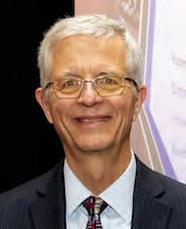
Robert Feenstra, Ph.D., the C. Bryan Cameron Distinguished Chair in International Economics at University of California (UC), Davis, presented The University’s 37th Henry George Lecture in November on campus. Dr. Feenstra presented “The ‘China Shock’ After 22 Years,” detailing his assessment of the economic impact of trade with China over the past few decades.
Among the distinguished list of speakers who have spoken at previous lectures are 11 winners of the Nobel Prize in Economics: David Card (2021) Paul Romer (2018), Robert Shill-
Accolades received since our last edition.
U.S. News & World Report
2024 “Best Online Graduate Programs” - February 2024
• U.S. News & World Report ranked Scranton No. 52 in the nation among “Best Online Graduate Programs” for online master’s degree programs in business (excluding MBA) and No. 120 for its online MBA program.
2024-2025 edition of “Best Graduate Schools” - April 2024
• U.S. News ranked Scranton’s MBA specialty programs in accounting No. 19 in the nation in the online ranking.
Other nationally ranked graduate programs include:
• Business analytics, No. 25
• Finance, No. 28
• Rehabilitation counseling, No. 36
• Health care management, No. 41
• Part-time MBA program, No. 110
• Nursing, No. 130
• Doctor of Nursing Practice (DNP), No. 130
• The American Institute of Certified Public Accountants (AICPA) included Scranton among just 13 colleges in the nation recognized for their efforts to increase interest in pursuing careers in accounting and to support students who have chosen that path. Several of the University’s initiatives were praised in “Strategies for Boosting Accounting Enrollment An AICPA Pipeline Acceleration Report” published in February 2024.
For the complete list of University rankings and other recognition, visit scranton.edu/pointsofpride

er (2013), Tom Sargent (2011), Peter Diamond (2010), Paul Krugman (2008), Joseph Stiglitz (2001), George Akerlof (2001), Amartya Sen (1998), Robert Lucas (1995) and Robert Solow (1987).
The lecture series is named in honor of the 19th-century American economist and social reformer and is supported financially by a grant from the Robert Schalkenbach Foundation.

In 1983, as an international student, Nabil Tamimi entered The University of Scranton MBA program in operations management. Ten years later, he returned as an educator in the Kania School of Management. Throughout his 31 years on the faculty and 17 years as chair of the Operations and Analytics Department (previously called Operations and Information Management), Dr. Tamimi has been instrumental in developing a business analytics program that meets both student needs and industry expectations.
The department’s advancement, under Dr. Tamimi’s guidance, includes a steady stream of new offerings in the business analytics field: an undergraduate major (2019), a Master of Science (2020) available online and on-campus and a graduate certificate (in 2021). Business analytics specializations are offered in multiple master’s programs, including Business Administration (MBA), Accounting (MACC), Finance (MSF), Health Administration (MHA) and Health Informatics (MS). This prescient planning readied the University’s students to fill a need even before Forbes labeled it the “data science talent gap” in 2022.
In an interview with The Scranton Journal, Dr. Tamimi discusses the Operations and Analytics Department and new business analytics offerings he describes as ever-evolving and expanding.
How did the business analytics programs come about?
Our team conducted a benchmarking study on highly sought-after programs in business analytics and identified the
key skills that are integrated into the coursework. Since business analytics is one of the fastest-growing professions, we wanted to create programs designed to teach students how to analyze complex data for informed decision-making.
This restructuring has facilitated student placements at Deloitte, Goldman Sachs, and CHOP (Children’s Hospital of Philadelphia) and Fortune 100 companies. But what I find most rewarding is taking something intimidating for students and making it relatable, leading to their “light-bulb moment” as they learn to apply these essential skills practically.
Developing the curriculum has been a collaborative departmental effort.
What has contributed to the growth of your business analytics programs, particularly for graduate enrollment among international students?
Our well-designed curriculum covers a broad range of relevant topics. Hands-on projects, case studies, and the use of industry-standard tools and software give students a practical approach to learning.
Additionally, our STEM-designated program offers numerous benefits for international students. STEM (science, technology, engineering and math) fields are in high demand worldwide, with many countries facing a shortage of skilled professionals that increases the likelihood of securing employment after graduation. International students in STEM programs are also eligible for Optional Practical Training (OPT), allowing them to work in the U.S. for up to three years post-graduation.
This extension provides ample time to gain valuable work experience and improve employability. For international students aiming to maximize their return on investment in education, our programs offer a significant advantage.
How do you feel about the recent national recognition of the business analytics specialization in Scranton’s MBA program? It’s ranked 25th in the nation in U.S. News & World Report’s 2024-25 Best Graduate School listing.
This accolade is a testament to the dedication and expertise of our faculty, who are deeply committed to student success. Their rigorous academic standards, combined with real-world experience, have created an enriching learning environment that equips students with the critical skills needed in today’s data-driven business world.
How do majors in supply chain management and business analytics enhance career potential for Scranton graduates?
We have all the key industry skills incorporated into our courses. Students learn about process optimization, logistics, procurement, and inventory management, which are essential for cost-effective operations. We realize that companies across various sectors need professionals to optimize their supply chains, improve efficiency and reduce costs and structure. Our curriculum is structured to address these needs across myriad industries.
Our business analytics program focuses on analyzing data so students can learn how to make informed business decisions, a skill increasingly important as companies seek to leverage big data for competitive advantages. This helps our graduates become versatile and capable of pursuing a wide range of career paths for interpreting historical data, predicting future trends, and prescribing actions.
The emergence of AI (Artificial Intelligence) has increased the demand for data analysts, business intelligence analysts, and data scientists. Our faculty seeks innovative ways to integrate AI into their coursework to equip students with the essential skills needed to excel in these positions.
How does the graduate certificate in business analytics provide essential business analytics skills?
This certificate arms students with fundamental skills crucial for professionals in business analytics. It offers valuable micro-credentialing, acting as a gateway to pursuing either an M.S. degree or specializing in analytics within an MBA
program. Specifically designated for STEM, this certificate is tailored for those seeking to enhance their expertise without committing to a full master’s program.
The considerable market demand for such skills, alongside competitive salaries and extended OPT opportunities for international students, underscores the immense value of our certificate program
Tell us about the department’s future offerings and initiatives.
In the fall of 2024, we are renaming our operations management major and minor to “supply chain management” to encompass a broader spectrum of traditional operations management studies. We also continue to adapt to evolving trends, including the integration of AI into our courses. Additionally, we are considering Six Sigma certification to provide our students with another valuable micro-credential, enhancing their competitiveness in the job market.
What attracted you to The University of Scranton when you were pursuing your MBA, and what inspired you to come back years later as a faculty member?
I was initially attracted to The University of Scranton for my MBA due to its strong emphasis on Jesuit values, the personalized attention from faculty, and the robust alumni network. These factors provided a supportive and enriching environment that helped me grow both academically and professionally.
Returning as a faculty member was inspired by my desire to give back to the community that had such a positive impact on my career, and to contribute to the University’s mission of educating the whole person.
You’ve been chosen as KSOM Professor of the Year twice by student vote during your tenure. How do you effectively engage your students and make abstract concepts relatable for them?
To effectively engage my students and make abstract concepts relatable for them, I use a lot of customized videos that I create specifically to illustrate complex ideas in a visual and practical manner. These videos often include real-world examples and applications that help bridge the gap between theory and practice. Moreover, my classes incorporate hands-on applications that allow students to directly engage with the material and see the immediate impact of their learning. This combination of personalized content, interactive methods and practical applications helps make the learning experience more engaging and accessible for my students.

In a glass-walled, fifth floor ham-radio studio at the University, a team of students led by a physics faculty member researched changes in the Earth’s Ionosphere during the total solar eclipse on April 8. A NASA-selected, ham-radio-leveraged eclipse research project of Nathaniel Frissell, Ph.D., assistant professor of physics and engineering at Scranton, spanned the globe in coverage. Dr. Frissell’s project was one of just five Citizen Science Investigations selected by NASA for the study of the total solar eclipse.
NASA, the National Science Foundation (NSF), and other grants awarded to Dr. Frissell, have supported the development of an international network
of ham radio operators to collect and monitor changes in the ionosphere. In the fall of 2023, the University installed state-ofthe-art ham radio equipment and antennas on the roof of the Loyola Science Center, supported by an Amateur Radio Digital Communications (ARDC) grant awarded to Dr. Frissell.

The project was covered in news broadcasts by the BBC globally, as well as by national news outlets in the United States, including USA Today, NASA Science, Scientific American, Science News Explores and Newsmax TV. University student Tom Pisano ’25, an electrical engineering major from Staten Island, New York, was interviewed in a BBC article that was picked up at publications in Saudi Arabia and Kenya.
The University’s Accounting Department and its faculty members have again ranked among the world’s top publishers of education research published in peer-reviewed accounting journals. The recently published 2023 Brigham Young University Accounting Rankings, which is considered to be the gold standard in accounting disciplines, ranked the Accounting Department No. 11 (tied) in the world for accounting education research published in the most recent six-years.
The 2023 report also ranked Douglas M. Boyle, DBA ’88, professor and chair of the Accounting Department and director of the Ph.D. program, No. 5 (tie) in the world for accounting education publication volume in top peer-reviewed accounting journals in the past six years. James F. Boyle, DBA, ’86, G’04, associate professor of accounting and director of the Master of Accountancy program, was ranked No. 25 (tie).

Cristen M. Walker, Ph.D., assistant professor of nursing, was chosen as Teacher of the Year by the University’s Class of 2024. Dr. Walker, who joined Scranton in 2020, is the undergraduate director of the nursing program and serves as a medical-surgical clinical instructor for junior and senior students.

Four years after arriving on campus, Assistant Professor of Philosophy Christopher Fremaux, Ph.D., has earned Scranton’s 2024 Gannon Award for Teaching, selected by student members of the National Jesuit Honor Society. His research “Crusisu’s Guide to Living Rationally: A Translation Report,” was supported by one of 11 faculty development summer grants in 2022.
Shuhua Fan, Ph.D., professor of history, received a grant to research “Confucius Institutes in the Xi Jinping Era: From Peak to Demise in the United States.”
Ozgur Isil, Ph.D., associate professor of operations and analytics, received a grant to research “Infusing ‘Ecological Education’ (Laudato Si’ Goal) into the Curriculum.”
Matthew Meyer, Ph.D., professor of philosophy, received a grant to research “Neitzshe’s Thus Spoke Zarathustra.”
Brian Snee, Ph.D., ’93 associate professor of communications and media, received a grant to research “Unfettered: The Rhetoric of John Fetterman’s 2022 U.S. Senate Campaign Chapter 4: ‘That’s what she said:’ Humor as Inoculative Incongruity in Gisele Fetterman’s Primary Acceptance Speech.”
Jong-Hyun Son, Ph.D., associate professor of biology, received a grant to research “Functional Characteristics of Oxygen in the Developing Dopaminergic Neurons of the Vertebrate Brain.”
Ziqian Song, Ph.D., assistant professor of operations and analytics, received a grant to research “Words That Move Markets: Investigating Predictive Textual Features during Corporate Events for Stock Analysis.”
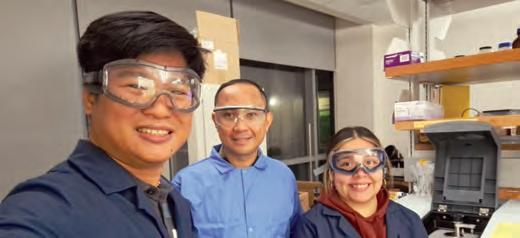
Associate Professor of Chemistry Dr. Gerard G. Dumancas worked with Scranton graduate students and published two original research articles in American Chemical Society (ACS) journals this year. The overarching goal of Dr. Dumancas’ laboratory is to develop novel, faster and inexpensive analytical methods to detect adulteration of a wide array of food commodities including honey, turmeric powder, coffee and egg whites.
In the first manuscript, MS in biochemistry graduate student Noemi Carreto ’22 worked on research which was published in the Journal of Chemical Education.
In a second manuscript, MS in biochemistry graduate student Norwell Bautista published in the Journal of Agricultural and Food Chemistry

Dr. Yamile Silva, Ph.D., chair of the Department of Languages and Cultures and Director of Latin American and Latinx Studies, has been selected as winner for best scholarly Collaborative Project by the international professional organization GEMELA, Grupo de Estudios de la Mujer en España y las Américas pre-1800. The dossier was co-edited with Dr. Ana María Díaz Burgos, Oberlin College.
Karen E. Robson, Ph.D., DNP, NI-BC ’99 recently published a feature article in the Journal of Informatics Nursing entitled, “Trends in Long-Term Care Facility Resident Outcomes Before and After Federal Regulations Limited Antipsychotic Medication: A Secondary Analysis.” Dr. Robson has been an adjunct faculty member in the Nursing Department since 2010.
Dr. Peter Andersen, associate professor of marketing at Scranton’s Kania School of Management has recently published a research paper under the title “Math Anxiety Effects on Consumer Purchase Decisions: The Role of Framing” at Marketing Letters, one of the top journals in the field of marketing. Co-authors include Dr. Fei Weisstein, associate professor of marketing at Bowling Green State University and Dr. Kent Monroe, professor emeritus at the University of Illinois-Urbana Champaign.
The University of Scranton’s Office of Community-Based Learning was recently highlighted in Jesuit Higher Education: A Journal for its research titled: “Implication of a CommunityBased Learning Faculty Fellows Program to Facilitate Teaching and Learning in the Jesuit Tradition.” Dr. Debra L. Fetherman, Associate Professor of Health and Human Services, CBL Faculty Coordinator, was lead author on this project. Coauthors included Julie Schumacher-Cohen, Vice President of Community and Government Relations, along with inaugural CBL Faculty Fellows: Dr. Ovidiu Cocieru, Dr. Gerard Dumancas, Dr. Brian Snee ’93 and Dr. Patricia Wisniewski.
A research article “The Fraud Prevention Pyramid,” written by Douglas M. Boyle, DBA ’88 received the 2024 Curt Verschoor Ethics Feature of the Year Award from the Institute of Management Accountants’ Committee on Ethics and Strategic Finance. This is the second time he has received this national award. The article, published in Strategic Finance in March of 2024, was written by Dr. Boyle and Dana Hermanson, Ph.D., professor of accounting at Kennesaw State University and the Dinos Eminent Scholar of Private Enterprise.
Enjoy these photos from a few of our signature alumni events
In January, alumni, parents and friends of the University in the Garden State enjoyed a cocktail reception with Rev. Joseph G. Marina, S.J., University president, at Baltusrol Golf Club.

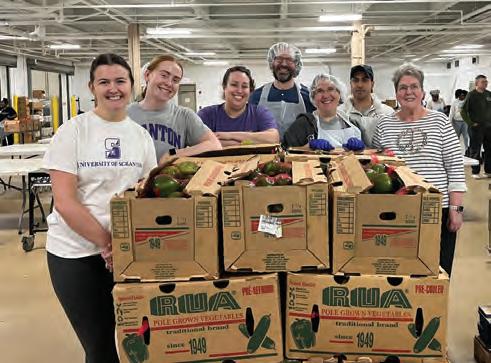
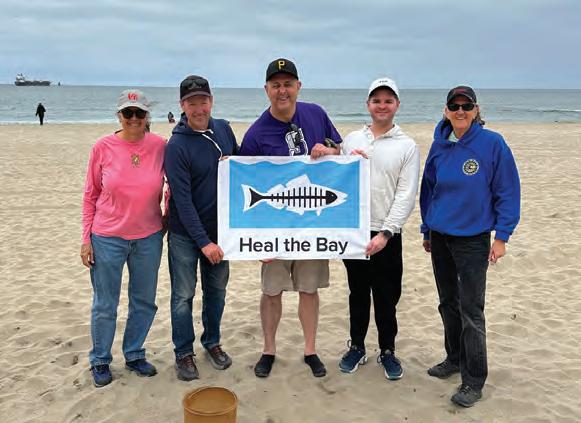
On March 1, the Council of Alumni Lawyers (CAL) hosted a networking reception with Pre-Law Society students at The Orange Lawn Tennis Club in South Orange, New Jersey.
On April 13, nearly 150 alumni, parents and friends of the University gathered in California, Atlanta, Chicago, Boston, New York City, Harrisburg, Philadelphia, Dunmore, Washington, D.C. and Raleigh, North Carolina, for the Day of Service, an annual opportunity for Royals to serve their respective communities.
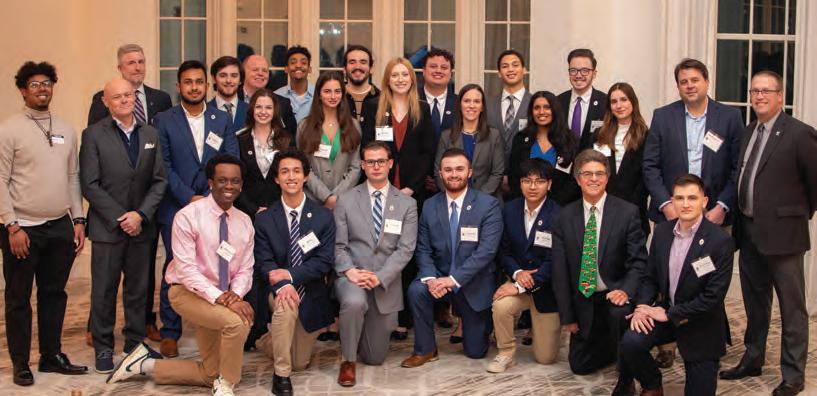

In February, scores of alumni returned to campus to network with current students at Royals 2 Royals, a new event sponsored by The Alumni Society and The Roche Family Center for Career Development.
In April, alumni, parents and friends of the University gathered with current students, faculty and staff members to celebrate the 2023 Scholarship Brunch.

In March, nearly 600 recent grads returned to campus to celebrate the 14th Annual Shamrockin’ Eve with more than 400 members of the Class of 2024.


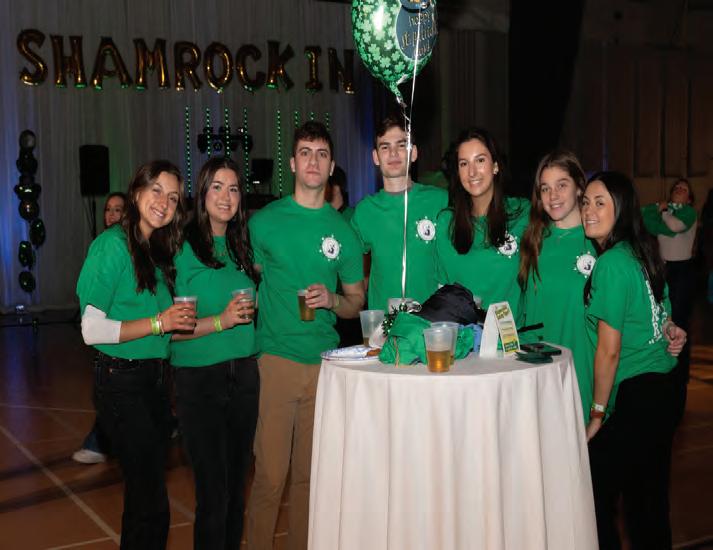
Continued on page 20
In June, alumni from class years ending in “4” and “9” returned to campus to celebrate Reunion Weekend 2024.
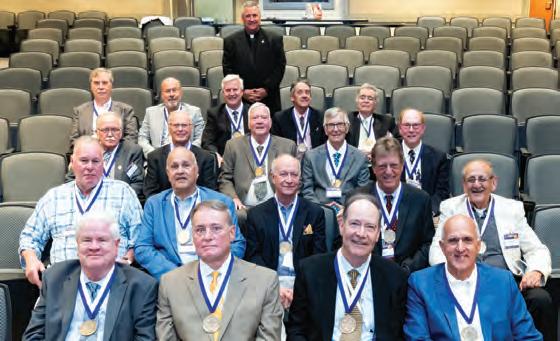

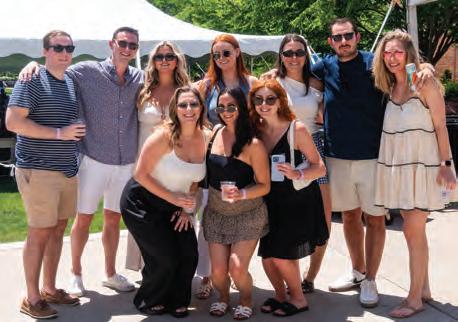
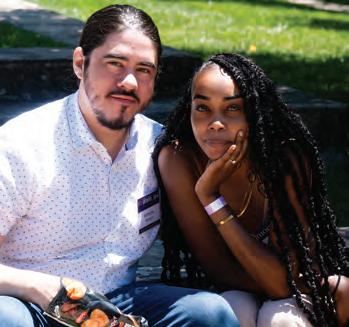
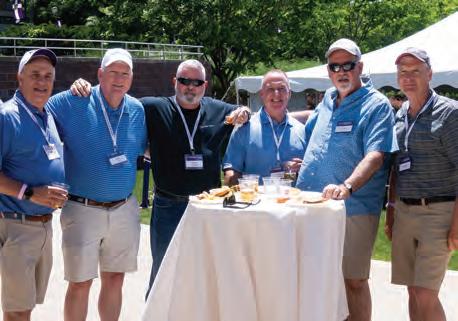


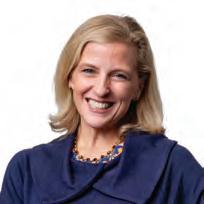
Erin E. O’Malley-Stewart ’94, G’97
Herndon, Virginia
· Principal, Saint Theresa Catholic School
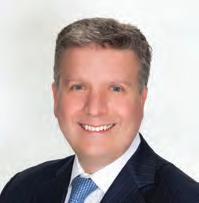
Paul W. Lameo, CPA ’94 Summit, New Jersey
· Partner, Banking & Capital Markets Group,
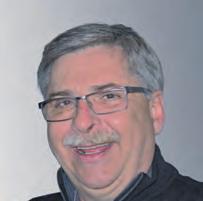
Timothy H. Scully Jr. ’74 Burbank, California
Vice President, Government Affairs (retired) MillerCoors Brewing Company

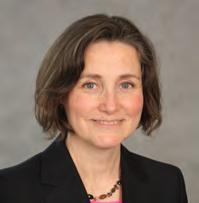
Ellen M. Boyle, Esq. ’84
Long Beach Island, New Jersey
· Deputy General Counsel, Head of Commercial Insurance Products Legal, American International Group, Inc.
On Friday, June 14, The Alumni Society and The University of Scranton honored eight alumni with the Frank J. O’Hara Distinguished Alumni Award, the highest recognition they jointly bestow. Named in honor of Frank J. O’Hara ’25, H’56, an administrator who served the University for more than 53 years, the award is presented to select alumni who have achieved distinction in their professional or personal endeavors.
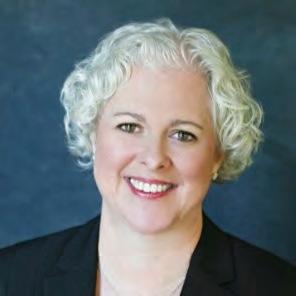
Regina Dolan Donohue ’89 Middletown, New Jersey
· Sr. Vice President, Chief HR Officer, Intra-Cellular Therapies

Brian M. Duke ’79 Washington Crossing Consultant and Advisor, Aging
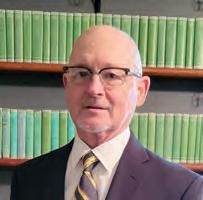
Richard J. Klonoski, Ph.D. ’74, P’07,’09 Scranton
· Professor of Philosophy, The University of Scranton
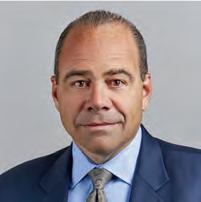
Michael F. Guarnuccio, CPA ’89
Avon-by-the-Sea, New Jersey
· Audit Partner, PricewaterhouseCoopers
Continued from page 17
On May 6, more than 2,500 alumni, parents and friends of the University celebrated 5.06.24, Scranton’s 10 th annual Day of Giving, by raising more than $550,000 for a wide variety of campus causes, including scholarships, athletics and service programs. As part of the celebration, the University partnered with Valley in Motion, a local nonprofit, for The Office 5K Season Three, which was held in downtown Scranton on May 4. Joseph Kilpatrick ’27, a member of the Men’s Cross Country and Track and Field teams, won the race, proving once again that there “ain’t no party like a Scranton party, ‘cause a Scranton party don’t stop.”

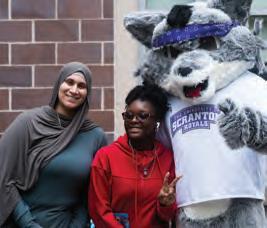

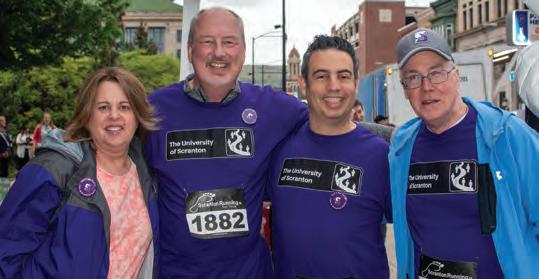


On the eve of undergraduate commencement, the legacy students of the Class of 2024 gathered with their families and the Rev. Joseph G. Marina, S.J., University president, as they prepared to “go forth, and set the world on fire.”

On June 24, the University honored basketball and broadcasting legend P.J. Carlesimo with the 2024 Peter A. Carlesimo Award at the Carlesimo Golf Tournament & Award Dinner.
The annual celebration, which was held at the Philadelphia Cricket Club, raised more than $100,000 for Scranton Athletics. Quandel Construction Group served as the event’s title sponsor.
More than 250 alumni, parents and friends of the University participated in the golf tournament, and an additional 50 guests attended the award dinner.
While accepting the award, Carlesimo remarked upon the special significance of receiving an award named after his late father, Peter A. Carlesimo, who served the University for nearly 25 years as a coach and athletic director during many of P.J.’s formative years.
“It’s a little unusual when you get an award and it’s got your father’s name on it,” he said. “For a good 40 years or so, people would ask me, ‘Are you Pete’s son?’
“I think that when we can give our sons or daughters a name that they’re proud of, it’s really special, and I’m Pete’s son.”
In nearly 40 years as a basketball coach, P.J. Carlesimo enjoyed immense success at both the college and NBA levels. As Seton Hall’s “Coach of the Century,” he won 212 games and made six NCAA Tournament appearances; additionally, he served as an assistant coach of the 1992 U.S. men’s Olympic basketball team that was better known as “The Dream Team.”
As an NBA head coach, Carlesimo won 239 games, and, as an assistant coach, he won titles with the San Antonio Spurs in 2003, 2005 and 2007.
In addition to his coaching success, Carlesimo has also been a significant contributor in the broadcast booth, and he is the only broadcaster in history to call the Olympic Gold Medal basketball game, the NCAA championship game and the NBA Finals.
Since 2011, the Peter A. Carlesimo Award has been presented to someone who has made special contributions to athletics and Catholic education. The Golf Tournament and Award Dinner serve as fundraising events to support and enhance the student-athlete experience at The University of Scranton. For more information, visit scranton.edu/carlesimoaward
The University of Scranton Athletics Department recently capped off a historic year for several of its teams with seven Landmark Conference titles, six NCAA Tournament appearances and five NCAA Tournament victories over the course of the 2023-24 academic year.
Multiple programs also set new marks for single-season victories and a total of eight student-athletes earned All-American honors in their respective sports.
“The type of success we experienced this year does not happen by accident. My thanks and congratulations to all our student-athletes, coaches, administrative staff and support staff! I am incredibly proud of the culture that we have built, driven by ’Royal Way’ touchstone,” Executive Director of Athletics Dave Martin said.
The women’s soccer program kicked things off this past fall with a fourth consecutive Landmark title. Then both the women’s basketball and women’s swimming and diving programs captured conference championships in winter.
The women’s basketball program marked a ninth consecutive Landmark title, and the team advanced to the Elite Eight, following NCAA Tournament victories over Framingham State, Ohio Northern and Johns Hopkins universities.
In spring, the men’s golf, men’s and women’s lacrosse, and baseball teams all won Landmark Championships, which helped catapult Scranton to a second-place finish in the Landmark Presidents’ Trophy standings. For the trio of men’s golf and men’s and women’s lacrosse, it was a second straight conference crown. Scranton’s baseball program came out on top for the second time in four years.
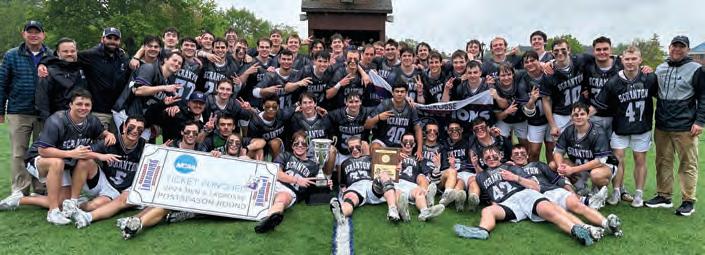



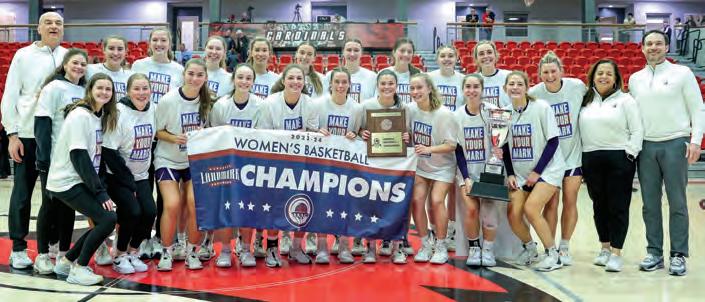


Men’s lacrosse hosted John Carroll in a first-round NCAA Tournament contest and used an overtime game-winner from senior Matthew McAree ’24 to capture a 10-9 victory, the first NCAA victory in program history.
The women’s lacrosse program defeated Lake Forest College in the first round of the NCAA Tournament by a
score of 18-6, marking the second Tournament victory in program history and the first since 2004.
Scranton baseball and women’s lacrosse teams set records for single-season victories. The former notched the first 30-win season in program history, while the latter posted a single-season best 17 wins and was ranked 24th in the final Intercollegiate Women’s Lacrosse Coaches Association (IWLCA) Top 25 poll.
“I would also like to take this opportunity to say thank you to our administration, donors, parents and loyal
For four years, Noelle Walker ’23 played as a key member of the back line for The University of Scranton women’s soccer team, regarded as having one of the best defenses in the country. In both 2021 and 2022, the Royals ranked in the top 10 nationally in both shutouts and fewest goals allowed enroute to consecutive NCAA Sweet 16 appearances.
Walker has since taken on a new defensive role helping patients in their battle against cancer. She joined the team at Memorial Sloan Kettering Cancer Center in New York City shortly after graduating from Scranton with a Bachelor of Science in nursing and has quickly grown to love working on the adult inpatient Bone Marrow Transplant floor.
“I am learning so much and love both the floor and the hospital, as well as the sweet patients,” said Walker.
In her role she administers chemotherapy treatments, peripheral stem cell transplants and central line dressing changes, and draws lab samples, among other responsibilities.
Walker always knew she wanted to become involved with oncology nursing based on her passion for the field and its impact on her family.
Both Walker’s mother, Joanne, and grandmother, “Nana,” have battled cancer, which made the drive to enter the specialty even stronger.
“I wanted to make an impact and make people feel the way that other nurses made my mom and Nana feel,” Walker said.
fans! Without all of you, we would not be able to achieve the many wonderful things that we have achieved,” Martin added.
Eight student-athletes earned AllAmerican honors in their respective sports: McAree ’24 and graduate student Colin Pierce ’23, G’24 (men’s lacrosse), Niamh Healy ’24 (women’s soccer), Katie Redding ’24, G’25 (field hockey), Erin Keaveney ’25 and Deanna Whelpley ’26 (volleyball), Kaci Kranson ’26 (women’s basketball) and Grace Lane ’25 (women’s lacrosse).
On the adult inpatient Bone Marrow Transplant floor, Walker connected with another Scranton women’s soccer alumna whose career path led her to Memorial Sloan Kettering. Walker’s teammate, Becca Russo ’20, also dedicates her talents to the care of cancer patients.
“It is incredible to have two former women’s soccer players working together at Sloan Kettering. It shows how the connections that are made at the University and through the women’s soccer program will last forever,” head women’s soccer coach and Assistant Athletic Director/Senior Woman Administrator Colleen Pivirotto ’04 said.
During her time at Scranton, Walker earned Dean’s List honors in all eight semesters and was a three-time member of the Landmark Conference Academic Honor Roll. She said this helped her feel extremely prepared for her new role.
“The Scranton nursing program is phenomenal, and I felt so prepared thanks to all of the teachers and professors,” Walker said.


First Cohort Graduates, Faculty and Founder Offer Insider Perspective on The University of Scranton’s Pioneering Prison Education Program
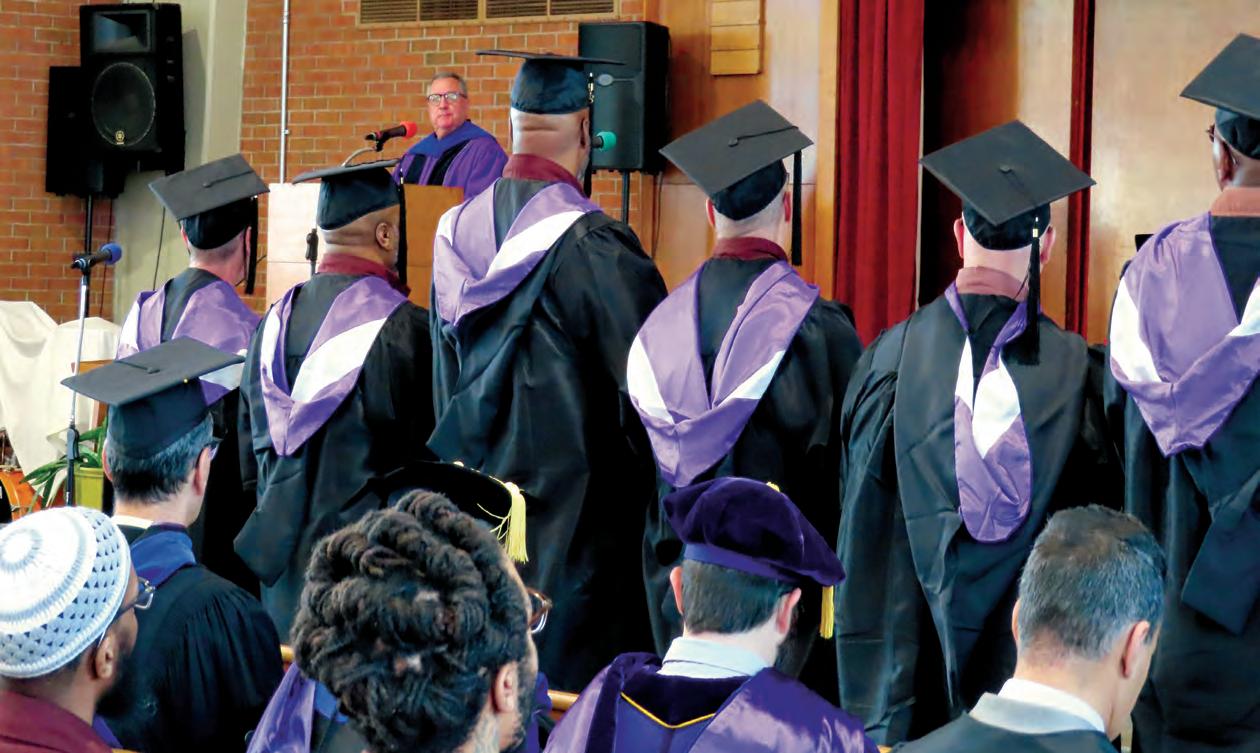
In fall 2021, an initiative unique to The University of Scranton and rare among Jesuit higher education institutions welcomed its first cohort. Just over two years later, these Royals received their Associate of Arts degree in liberal studies through The University of Scranton Prison Education Program at Dallas State Correctional Institution (Dallas-SCI).
In their own words, the graduates of this pioneering program discovered hope and encouragement, a sense of purpose, self-esteem and educational goals. Their feedback, emphasizes gratitude and lauds the supportive Scranton faculty. One student who graduated in December 2023 explains, “How do I convey what it is like to feel human? That is how The University of Scranton impacts me. I know I return to my humanness. I still have value to others, and with this blessing of continued education, I intend to be a blessing to those who cross my path in life.”
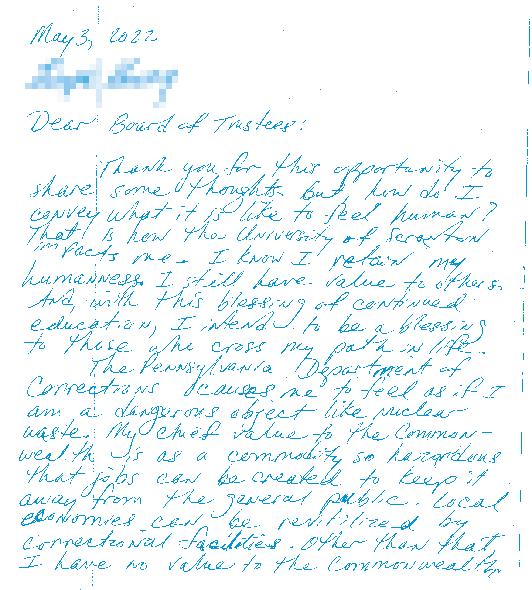
Another student shares a story that personalizes the impact of the free education offered to all students who are accepted into the program.

“One week after my mother lost her struggle with Covid-19, I received my acceptance letter to The University of Scranton. That piece of paper and the opportunity it signified was a shining beacon of hope in a very dark time. Soon thereafter, Christopher Haw led a caring group of professors into our place of imprisonment, greeting us with open arms, and began the process of pulling us back into the light. Their faith in our abilities and kindness was something few, if any, of us have ever experienced in a correctional setting.”
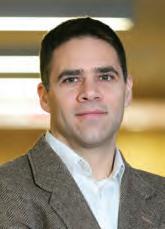
Christopher Haw, Ph.D., Scranton Prison Education Program founder and director since inception (groundwork in fall 2018; first course in fall 2021), discusses the inspiration he experienced while earning his Ph.D. at The University of Notre Dame and teaching in a prison education program created by Notre Dame and Holy Cross College.
“People sometimes refer to prisons as informational deserts: the psychological and logistical conditions tend to starve or distort the mind, restrict information, and compress the soul. And such mental deserts quickly bloom with the ‘rain’ of high-intensity education, pitched at a level that dignifies and confirms them as capable learners,” says Dr. Haw, associate professor of theology and religious studies at Scranton.
“Over the course of two semesters of teaching at that Notre Dame program, I was lucky enough to have the same students. And during our few dozen sessions together, I was able to see dramatic improvement and growth in virtually all.
“I immediately understood why some schools do college in prison not only for missional reasons but as faculty enrichment. Most professors who teach in prison become more inspired and rigorous. I soon resolved that, wherever I could get hired as a professor, I would want to start such a program.”
The University’s Prison Education Program aligns with Scranton’s Jesuit mission to extend education and care to marginalized and under-served populations. Through the program, inmates can take general education college-credit courses taught by University professors on-site at the correctional facility. Participants can earn 60 credits for an associate’s degree in just two and a half years.
The program’s inaugural cohort surpassed expectations, with participants completing a combined total of over 1,000 credit hours.
“Every one of those was hard won; on both the student and University side,” said Dr. Haw.
“I am extremely happy with what we’ve achieved. We surpassed my initial goals of when we would start — setting things up within a few years of my hire, not the several years that some veterans in the field told me to expect,” Dr. Haw said. He attributes this in part to the support and quick uptake of the University’s administration, which seamlessly integrated it into the workflow.
“Besides securing Second-Chance Pell funding, we have also landed some hearty grants — at least on par with what I might have imagined before starting.”
This fall, Dr. Haw will run admissions for a third cohort for the program and prepare for the graduation of the second cohort of 14 students.
“Most professors who teach in prison become more inspired and rigorous.”
— Christopher Haw, Ph.D.
“I have the next several semesters’ worth of courses already scheduled. Some will be taught by new professors eager to join the fray,” said Dr. Haw.
The opportunity to have a transformational learning experience inspires Jesuit educators and incarcerated students to do more with less.

“Within these walls, the avenues for personal achievement are few and far between: art contests and weightlifting competitions. They aren’t comparable to an associate degree from a preeminent Jesuit University,” stated a graduate of the first cohort.
Billie R. Tadros, Ph.D., associate professor, Department of English and Theatre at the University, joined the program faculty 18 months ago, first attending study halls in spring 2023, then teaching in summer 2023.
“It was primarily program director Dr. Chris Haw’s restlessness that drew me to teaching at SCI-Dallas. I use the word ‘restlessness’ in the sense in which we sometimes refer to the Jesuit ideal of the Magis as the restless pursuit of excellence, the pursuit of more — not just more for oneself, but also more for others,” said Dr. Tadros, whose course, WRTG 107: Composition, has been well-received.
Dr. Haw guides faculty to maintain consistency in curriculum between Dallas satellite classes and main campus. In some cases, adaptation is necessary.

“Though a few students had access to typewriters, most students were completing their essays and assignments with pen or pencil and notebook paper, and no students had access to the internet for their assignments,” said Dr. Tadros.
“This required both the students and me to innovate in defining and perform-
ing what it means to research. All of the students enrolled in the course had access to a sizeable selection of course readings they drew from in their written assignments. …. the richer sources of research from which they drew were not only their own personal libraries … but, more importantly, their own lives.”
Dr. Tadros had never been inside a prison before joining the University’s program.
“Among what surprised me most was both how resilient the students and I sometimes were (e.g., when a prison lockdown delayed our class session, but we regrouped) and how inflexible I sometimes was (e.g., when limited access to printing at the prison forced me to change my lesson plans and my assignments, and I froze). Two things can be true at the same time,” she said.
“The truth of this statement is perhaps most apparent teaching in a prison, where you’re trying to promote freedom of inquiry in the space of the classroom — but where your students are not at all free, and where, in the spirit of the Magis and of striving for and giving more, you also have to learn to do your vocation with less,” said Dr. Tadros.
“According to David Mahalak, Ph.D., from the Kania School of Management, engagement in Statistics for Business classes soared when topics connected to students’ interests, like sports and the stock market, demonstrating the practical applications of probability and risk analysis in decision-making.

“It was great to see students actively engaging and thinking about the concepts they were learning in class. Then, asking questions about the application in various areas of business, sports and finance.”
The Prison Education Program has made him a better person, said Dr. Mahalak.
“I learned a very valuable skill set in adaptability. If the computer isn’t working, that’s OK. I can still deliver and provide students with a great educational experience.”
A Jesuit consortium, the Jesuit Prison Education Network (JPEN) officially launched in early 2023 and appears to be gaining momentum. Last fall, Dr. Haw attended the group’s first in-person gathering, which resulted in almost-monthly video conferencing discussions that “truly cross-pollinate our work.”
“St. Louis University (SLU) hosted part of the conference inside their partner-prison. A feature of the event was to celebrate SLU’s 15 years of prison education; and it was impressive to see how they had grown the prison into a mini-campus. I loved talking with their students and professors — and even their DOC staff.”
According to Dr. Haw, the collective is drawing in non-Jesuit Catholic schools, like Notre Dame, which will host a JPEN gathering this fall 2024 and fund the inclusion of DOC administrators.

The University will continue to offer lectures at another nearby prison, Waymart SCI.
“Their administration is very thirsty for education and very accommodating to any professors who want to visit. I’d like to keep introducing more professors to college in prison by getting them to offer just a single favorite lecture there.”
Dr. Haw said the hope is to continue graduating students with their associate’s degrees.
“This has, so far, occasioned a few students continuing college coursework down at Villanova’s bachelor’s program, hosted at SCI Phoenix. Perhaps we will someday expand to a bachelor’s degree, but we need to keep building rapport, stabilizing and expanding our funding base.”
To other Jesuit schools inspired to start programs, Dr. Haw extends advice and a gracious offer.
“Call me. Kidding, not kidding. Talk with preexisting programs. During my first year here, I interviewed 23 other college-in-prison program directors around the country, building a massive web of knowledge for myself on various fronts.”
Validation and inspiration arrive from a first-cohort graduate of The University of Scranton Prison Education Program.
“I came to prison as a teenager. I thought that I would never have the opportunity to go to college. Because of the length of my sentence,
“… the richer sources of research from which they drew were not only their own personal libraries … but, more importantly, their own lives.”
— Billie R. Tadros, Ph.D.
I was excluded from the Pell Grant programs once they came back. One day, I saw a memo posted on the wall about The University of Scranton’s associate degree program. … I was so happy because it was my first opportunity for higher education in the 20-plus years I’ve been incarcerated,” he said.
“The professors at the University are top notch, and it’s inspiring to see how much they care about us. It really means a lot. In the cold world that is prison, it’s nice to feel the warmth of some humanity.”
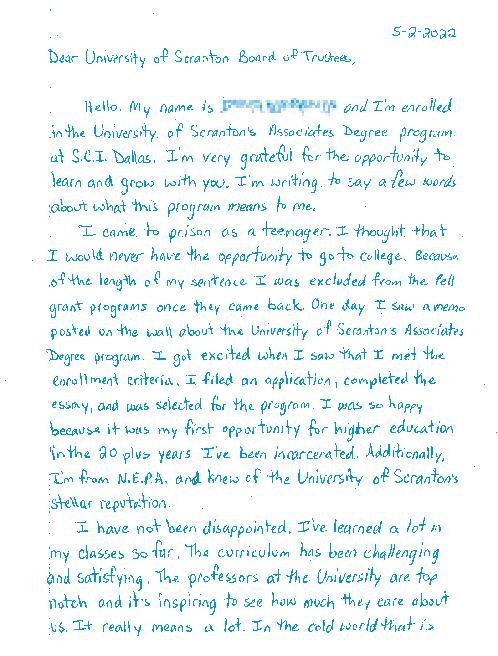

INSETS: The first cohort of The University of Scranton Prison Education Program at Dallas State Correctional Institution (Dallas-SCI) share their program feedback in the form of handwritten letters, shown.
Christopher Haw, Ph.D., founder and director, University of Scranton Prison Education Program and associate professor, theology and religious studies, shown at center, conducts classes in Theology II and Hermeneutics at the State Correctional Institution in Dallas, Pennsylvania. He discusses the 1,000 credit hours earned by students in the program: “Every one of those was hard won; on both the student and University side.”
While only 32 percent of philosophy bachelor’s degrees are awarded to women nationally, Scranton retains a remarkable 60 percent female enrollment in its philosophy major, with most who decide to pursue graduate study in philosophy securing placement in fully funded Ph.D. programs.
Kelly

Juliana Vossenberg Kazemi came to The University of Scranton a decade ago with designs on majoring in biology and pursuing a career in medicine. Upon arriving, she was invited to participate in the Special Jesuit Liberal Arts Honors Program (SJLA).
Almost immediately, she was taken with the program’s courses in philosophy.
“Going in, I didn’t know too much at all about philosophy. But I was immediately drawn to it, and the way that the faculty taught it,” she said. “Philosophy is something that brings you out of your normal mode to this more unique way of thinking and living.”
In fact, it changed the very trajectory of her life. Kazemi ’17 ultimately decided against medical school in favor of academia, and today she’s a third-year student in Baylor University’s doctoral program in philosophy.
Kazemi is part of a positive trend — she’s one of five female graduates of the Philosophy program currently enrolled in a top-tier Ph.D. program. While only 32 percent of bachelor’s degrees in philosophy awarded nationally go to women, according to the National Center for Education Statistics, about 60 percent of Scranton philosophy majors are female, putting the University right near the very top nationally.
All five women — Kazemi ’17, Bella Kelly ’19, Abbey Murphy ’20, Mary Purcell ’21 and Ariana Marseglia ’24 — were also products of SJLA, which every year invites 50 to 60 high-achieving first-year students to earn general education requirements through specially-designed courses in Western philosophy, theology and literature.
Juliana Vossenberg Kazemi ’17 is part of a positive trend she’s one of five female graduates of The University of Scranton Philosophy program who is currently enrolled in a top-tier Ph.D. program.
“I’m proud of the fact that we’ve had some extraordinary success in educating women in the field. We need more women getting academic positions in philosophy,” said Daniel Haggerty, Ph.D., professor and department chair of the Philosophy Department and director of SJLA. “Part of it is that really good things happen here in terms of scholarship and intellectual development. It’s a very supportive environment, not just the Philosophy program but also SJLA. The women who go through the program get a lot of encouragement and develop the confidence to feel like, ‘Hey, I can do this.’ And it gets them to think about their place in the world and what they want to do and where they want to do it.”
A good portion of the Philosophy program’s success can be attributed to SJLA — for many students, the program serves as their introduction to the subject.
Students invited into SJLA go through it as a cohort, taking 13 courses altogether, eight of which are in philosophy. From there, many are inspired to make it their primary major, a second major or a minor.
“It’s a uniquely mission-based honors program with philosophy at its core, which has produced tremendously successful graduates, a significant number of whom have majored in philosophy,” Dr. Haggerty said. “One of the nice things about it is that students are surrounded and supported by the same people for four years. The emphasis is never careerist, but cura personalis — caring for the whole person. And I think it has been important to women in the program to feel that kind of support. They get to think and talk about concepts that are complex, challenging and existential but also very personal. Students are welcome and encouraged to share and reflect on their experiences because the program isn’t cutthroat and impersonal. It’s collaborative and personal.”
“SJLA just transforms students’ worldviews — which I think is what we’re trying to do here at the University,” said David Dzurec, Ph.D., associate dean for the College of Arts and Sciences and professor of history.

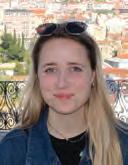

“It’s exposing them to bigger ideas — and helping them become better people. It lets them dive into philosophy in ways they never would have otherwise. They’re asking the big questions of life.”
That was certainly Kazemi’s experience. She immediately felt a close sense of community within the program.
In time, she decided to double major in philosophy and theology.
“I loved the faculty’s approach to philosophy,” Kazemi said. “For them, it’s more than just showing the concepts, but getting the students to wrestle with these ideas that humans have been wrestling with since the beginning of time. They very much gave each philosopher and philosophical idea its own time to shine and encouraged us to wrestle with each one. They’re preparing students to live deeply and reflectively. They wanted each of us to become our own person and were so invested in our personal growth. No other educational experience I’ve had since has risen to it.”
Marseglia graduated from the University in the spring and is now a first-year student in the University of Memphis’ Ph.D. program. That’s a long way from where she was four years ago as a prospective neuroscience major with “a hint of an interest in philosophy.”
She had an epiphany of sorts in a metaphysics class taught by Dr. Haggerty.
“It unlocked a huge door for me, and my interests went in sort of a metaphysical direction — I grew kind of bored with scientific approaches. You don’t lose your sense of wonder in the world when you study philosophy,” Marseglia said. “And I loved that the discussions with other students didn’t feel like we were just studying for a test. And the faculty were fantastic — they’ll talk to you inside and outside the classroom about anything. To me, it showed how fulfilling philosophy could be as a discipline, and how the content can be applied to so many aspects of life.”
Before long, Marseglia realized she should take her education in a different direction. She approached Dr. Haggerty one day and said, “I don’t want to do what I’m doing anymore. I want to do what you’re doing.”
“He said, ‘That’s fantastic, but I think you should wait a while and think about it and make sure you’re really sure about it,’” she said. “So, I spent the next semester and then some thinking about whether there was anything else I wanted to do. And there was nothing else I wanted to do.”
Dr. Haggerty said another part of the program’s special sauce is that he and the other Philosophy faculty members forge close bonds with students, who know they can always drop in during office hours for wide-ranging discussions about courses, career aspirations or just their lives in general.
Independent studies are encouraged, and faculty members also make time for tutorials, readers and other assistance.
“It’s not a pressure cooker in the program; while we aspire for excellence, our approach is personal and it’s friendly,” Dr. Haggerty said. “The faculty are promoting a cooperative ap-
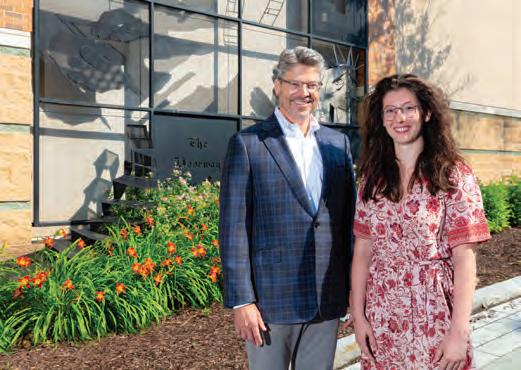
proach to learning. We want them all to succeed and excel, and to help each other. I think that encouraging, challenging and cooperative approach really speaks to our female students. It shows we can all learn from each other.”
Andrew LaZella, Ph.D., professor of philosophy, served as the faculty adviser to Kelly, Murphy and Purcell. He said their research on women philosophers including Margaret Cavendish and Edith Stein has positively affected his teaching of the subject.
“Both of those philosophers were among those who traditionally did not have a seat at the table, and I’ve brought them into my own courses. I get to expose students to more marginalized thinkers, and it lets them see that the field is a lot more diverse than what the history has shown,” said Dr. LaZella, who is chairing a new committee that will provide guidance to philosophy students who are interested in graduate school.
In addition, the program simply provides a first-rate education. “Scranton is one of the few Jesuit universities that has maintained its deep commitment to the history of philosophy in conversation with the Catholic intellectual tradition,” Dr. Haggerty noted. At the same time, faculty are also at the forefront of the field’s current scholarship. That combination, he said, makes the curriculum ideal for those who wish to study philosophy at the graduate level.
One of Marseglia’s favorite approaches to philosophy is phenomenology, the study of reality as a subjectively lived experience. Her interest was developed through extensive talks she had with Duane Armitage, Ph.D., associate professor of philosophy. Those talks would guide her forward in her research, which now is applying phenomenology to the study of artificial intelligence (AI).
As it happens, the University of Memphis’ philosophy program is known for its expertise in phenomenology, so Marseglia was encouraged to apply there for graduate school.
“We do our best to help them make connections to other philosophy programs, which I think speaks well to how involved our faculty is within the profession,” Dr. Haggerty said. “And I think where we’ve had a lot of success is our recommendations. I really know the student when I write a recommendation, and I think it goes a long way.
“Another benefit we offer is a realistic vision of the profession, the competition of it, the economic challenges,” he added. “I don’t encourage students to take on debt to study philosophy. We want students to receive full scholarships.”
Kazemi and Marseglia said they both received extensive assistance with their applications and are both enrolled in a fully funded Ph.D. program.
“I can’t emphasize how helpful my professors were. They knew people at these universities, and where to steer me based on my interests, and whether the program was collegial or not,” Kazemi said.
Kazemi worked extensively with Dr. Haggerty during her time at the University. After graduating in 2017, she went on to receive master’s degrees in both theology and classics at the University of Notre Dame.
From there, she went to work for a year as she decided what her next move would be. She remained close with Dr. Haggerty and following a conversation with him about Aristotle’s thoughts on the nature of friendship, she began to reflect on her time at the University.
“The major question I had was about the friendship between teachers and students — and the place where I experienced this in such a profound way was in the SJLA program. So, philosophy seemed like the right discipline for me to go into,” Kazemi said. “Eventually, it gave me the topic for my dissertation, which will center around the topic of enchantment in education, and the role of the teacher as enchanter. … As an educator, I want to create the same type of environment that so benefited me in SJLA. I was given this incredible gift and now I have to pay it back to someone.”
Marseglia expressed a similar sentiment.
“I’m very grateful for my whole experience at the University,” she said. “If I look at who I was versus who I am now, I’ve grown in ways that I can’t imagine would have happened otherwise. Every aspect of my life has been touched in a very positive way thanks to my education.” Find out from alumni how the SJLA program provides students with an ‘incredible connection’ and classic Jesuit education at scranton.edu/journalextras
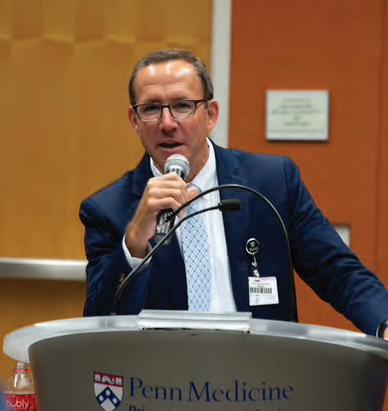


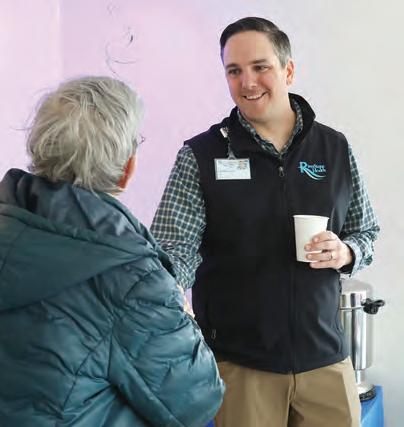
C-suite Leaders Outline Their Career Pathways and the Mentorship, Academic Programs and Jesuit Foundation That Enable Them To Answer the Call
From a very young age, James G. Demetriades ’00 was influenced by his grandmother, who was a nurse. Although he did not want to be a clinician, Demetriades was drawn to careers that help support the mission of health care.
“Listening to my grandmother’s stories gave me an appreciation for the impact that the health care profession can have in people’s lives,” he said.
Eventually, he realized there was another pathway, via the business side. That led him to The University of Scranton and its venerable health administration program.
Today, Demetriades serves as CEO of Penn Medicine Princeton Health, part of the University of Pennsylvania’s world-class health care system.
Demetriades is one of many graduates of the health administration programs making a difference in today’s highly complex, ever-evolving health care industry. The University offers both a Bachelor of Science and Master of Health Administration, with the latter offered both in-person and online.
About 40 students are currently enrolled in the bachelor’s program, while roughly 80 – combined on-campus and online — are in the MHA program. Many students opt for the accelerated bachelor’s and master’s option.
According to the U.S. Bureau of Labor Statistics, the number of medical and health services managers is expected to grow by 18 percent between 2018 and 2028.
“There is a growing demand for health care services in the U.S. as the baby boomer generation enters their Medicare years,” said Victoria H. Castellanos, Ph.D., dean of the Leahy College of Health Sciences. “The demand for both acute care services and long-term care services is increasing each year. Our two health administration programs are producing graduates who meet a vital need in the health care sector for welltrained administrators.”
The programs give students the opportunity to learn the ins and outs of the field through an interdisciplinary curriculum that includes coursework in business administration, management, finance and global health care issues, said Steven J. Szydlowski, DHA, professor and chair of the Department of Health Administration and Human Resources.
“We bring in current research to expose students to some of the macro trends in the health care industry,” Dr. Szydlowski said. “We’re constantly monitoring the external environment for trends and changes occurring with health policy, market considerations, the demands of the profession, etc., and adapting the curriculum and competencies to ensure graduates are prepared.”
Learn about career opportunities in the field of health administration with guidance from the University’s executive in residence at scranton.edu/journalextras
The campus itself also provides access to hands-on training, Dean Castellanos noted, thanks to the Edward R. Leahy Jr. Clinic for the Uninsured, which was recently reopened under a student-run model in partnership with Geisinger Commonwealth School of Medicine.
“To see the program evolve and change over the last 20 years has been inspiring — it shows we’re constantly looking at our mission and modifying it as needed, so that we’re preparing students for what we say we’re preparing them for,” Dr. Szydlowski said.
Of course, another great attribute of the Health Administration programs is its extensive and highly successful alumni network serving in leadership roles throughout the country — among them Demetriades. He has been with Princeton Health for 20 years and led the due diligence and operational planning processes that culminated in its integration into the University of Pennsylvania Health System in 2018.

He grew up near Jim Thorpe, Pennsylvania, and enrolled at the University in the mid-1990s, when health administration was still known as “hospital administration.” The major seemed like a good way to marry his interests in business, leadership and strategy within a health care context.
Demetriades said the “warm and inviting” Scranton community made an immediate impression.
“The Jesuit education is extremely special,” he said. “I loved the ‘care for the whole person,’ ‘men and women for others’ philosophy. In fact, I took a couple extra philosophy classes while I was there because I loved the whole idea of the contemplative mindset and the importance of being a good listener.”
An active student, Demetriades served as Student Government president and volunteered at Moses Taylor Hospital. Within the health administration program, he found great mentors like Daniel J. West, Ph.D., and Peter C. Olden, Ph.D.
One of the biggest skills I gained from the University was to lead with empathy – listen first and seek to understand.”
– James G. Demetriades ’00, CEO, Penn Medicine Princeton Health
“The faculty were health care executives who transitioned into academia, and they brought real-world perspectives to the classroom, whether it was health care finance, law, operations, the entire regulatory environment,” he said.
Through his Student Government role, Demetriades got to closely observe the leadership style of the Rev. Joseph McShane, S.J., H’04, the University’s then-president.
Often, he would hear Father McShane recite the St. Ignatius of Loyola quote, “Love is shown more in deeds than in words.” Today, the quote can be found on Demetriades’ desk. It serves as a good reminder for why he chose to work in health care, despite its abundant challenges.
“One of the biggest skills I gained from the University was to lead with empathy — listen first and seek to understand,” he said. “In health care, you have very high-powered physicians, strong-willed nurses, the support staff. You’re dealing with patients in their most compromised state. And you answer to a board. I think Scranton prepared me well to work with these very different audiences. My education there was foundational to the person I became. It had such a positive influence on me.”
John J. “Jack” Lynch III ’83, the longtime president and CEO of Main Line Health in the Philadelphia suburbs, tells a similar tale. With a physician father and a nurse mother, the profession made an early impression on him. He even spent his late teens working as an EMT in the Washington, D.C., area.

President & CEO, Main Line Health
“From that experience, I knew I didn’t want to be a clinician, but I wanted to have an impact on people’s health,” he said. “What I found more intriguing was the complexity of delivering care in challenging environments and how leadership could be a difference maker.”
One of the first undergraduates to go through the program, Lynch said he had great professors, among them longtime faculty member Robert J. Spinelli, DBA, and forged meaningful relationships with former presidents the Rev. William J. Byron, S.J., H’84, and the Rev. J.A. Panuska, S.J., H’74. Years later, he became friendly with the Rev. Scott R. Pilarz, S.J., H’15, during his presidency.
Lynch often tells people he took away five key lessons from his Jesuit education — work hard, act with integrity, seek knowledge, welcome accountability and use common sense when making decisions.
Knowing the community is counting on our leadership to care for them in their time of need is a huge responsibility, and when you do it well, it’s incredibly gratifying.”
– John J. “Jack” Lynch III ’83 President & CEO, Main Line Health
“Those Jesuit leaders leave imprints on you,” he said. “Of course, the concept of caring for others is also ingrained in you. We’re all God’s children and deserve to be treated with equity. Having that foundation to be a man for others, a steward for others, to act with the highest level of integrity, those foundational things — if you’re smart, they don’t leave you.”
Lynch spent 19 years working in Houston before taking the reins at Main Line Health in 2005.
“As challenging as the career has been, it’s been more rewarding than I could ever have anticipated,” he said. “Knowing the community is counting on our leadership to care for them in their time of need is a huge responsibility, and when you do it well, it’s incredibly gratifying.”
In 1999, Kim Jordan, DNP, G’03 was a highly experienced nurse looking to advance her career. The MHA program was exactly what she was seeking.
“By then, I had been on the clinical side for probably 14 years, progressively moving up in nursing leadership positions,” she said. “I wanted to continue proceeding through the ranks, but I knew I needed that business acumen. The
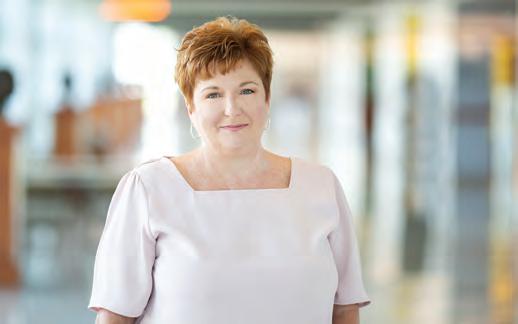
Master of Health Administration at the University had an excellent reputation, and for me was the best way to accomplish my goals.”
Dr. Jordan started her coursework while on staff as a nurse manager at the former Mercy Hospital in Scranton. She appreciated the fact that the University faculty had worked in the field, and that the program provided her with knowledge she hadn’t yet had the chance to learn on the job.
“The finance piece was a significant help,” she said. “As a nurse manager, you’re dealing with budget and finance. But it becomes a whole other level as you move up through ranks. The courses gave me a strong foundation in budgeting and finance reports, strategic plans, health care law. All those things were beneficial to me.”
Her graduate degree culminated with an administrative residency at Lehigh Valley Health Network (LVHN), where she had recently begun working. It provided her with great exposure within the system and led to a series of administrative roles. Today, she serves as president of the newly opened Lehigh Valley Hospital (LVH) — Dickson City and COO of LVH — Pocono.
I had been on the clinical side for probably 14 years, progressively moving up in nursing leadership positions. I wanted to continue proceeding through the ranks, but I knew I needed that business acumen.”

In a nice full-circle moment, students in the Health Administration programs are now doing internships at LVH — Dickson City, Dr. Jordan proudly noted.
“To now be in Scranton, I’m just so proud of everything we’re doing here. To hear how much patients love the hospital and the care, it gives me so much joy,” she said. “Thanks to the University, I got that other foundational piece I needed to learn and grow. It was a wonderful experience.”
Jonathan P. Forte ’07, G’09 had a similarly inspiring Scranton experience, which eventually led him to his current role as CEO and Health Officer at RiverStone Health, where he oversees a network of federally qualified health centers, a home health and hospice program, and the Yellowstone County Health Department, in Billings, Montana.
Prior to life under the Big Sky, he served as senior vice president and COO at Choptank Community Health System in Maryland and spent nearly a decade with the Veterans Health Administration.
“After a decade in health care, the idealist turned into a realist,” Forte said with a laugh. “While I might not be able to fix a broken American health care system, I can create positive change and make it better wherever I am right now. I have fun every single day. Many days are very stressful, but at the end of the day, I’m still passionate about the work of providing health care to people who wouldn’t have it otherwise.”
Originally from the Poconos, Forte enrolled at the University to study biology as a precursor to medical school. Along the way, he picked up a minor in health administration, which helped him realize he could improve health care delivery in different ways.
Upon graduating, he decided to stay and pursue his MHA. Scranton’s MHA program provided a terrific foundation, he said, listing a litany of benefits, from his fellow students and alumni, who he still seeks input from today, to his international experiences studying the health care systems of Great Britain and China. Scranton MHA graduates are truly men and women for others, with a global perspective.
“The other benefit was being immersed in the health care world of NEPA in the early 2000s, which was all about systems merging and evolving, “ Forte said, ‘We’d be in a health care finance class listening to the helicopter at CMC and try to tally up how many times it landed so we could see how much the hospital was losing in trauma care.”
Of course, he said, the Jesuit ethos has stayed with him throughout his health care journey.
“Being able to question everything and critically think about issues facing healthcare today, and taking an analytical approach to tackling problems — that was baked into me by my Jesuit education,” Forte said. “And cura personalis — in healthcare, we start with respect for the whole person. Providing individualized attention to their lived experience, while treating everyone as human beings, meeting them where they are on life’s journey.”
Being able to question things and critically think about problems and challenges, and taking an analytical approach to tackling problems— that was baked into me by my Jesuit education.”
– Jonathan P. Forte ’07, G’09, CEO and Health Officer, RiverStone Health

Jimmy Lynett ’97 upgraded a port of call on his professional journey to the career destination of a lifetime.
“One of the great benefits of my role is I get to experience some of the most beautiful destinations in the world,” said Jimmy Lynett ’97, executive entertainment director at Disney Cruise Line, shown here at Grenville Channel, British Columbia, Canada.
At the outset of his career, Northeast Pennsylvania native Jimmy Lynett ’97 secured a position with globally recognized multimedia and entertainment enterprise, Walt Disney Company. The opportunity with Disney Cruise Line in the Youth Activities Program (think: camp counselor) appealed to Lynett’s affinity for the ocean. For a young twentysomething who had recently earned a bachelor’s in communications, it presented a shortterm opportunity to sharpen those skills. Instead of a port of call on his professional journey, though, the experience inspired more than two decades of transformational leadership and resulted in a Disney wish come true.
“Funny thing is, I only planned to work on the ship for a year or so and then I would get a ‘real job.’ … I found so much variety, learning and growth opportunities, and enjoyment in my roles that I decided … maybe this will be my ‘real job,’ and it has been for the past nearly 25 years and counting!” said Lynett, who currently oversees 200-plus employees and leaders as Executive Entertainment Director at Disney Cruise Line.
“I find that communication is at the heart of what I do on a daily basis. Majoring in communications at The University of Scranton provided me with a solid foundation of knowledge that is highly beneficial to my current role,” said Lynett. He referenced skills in verbal and nonverbal communication and conflict resolution, in addition to media literacy.



“I started back in December of 1998 working in the youth spaces onboard. I enjoyed the role and made so many friends from around the world. The ship’s complement of crew represented nearly 60 different nationalities. At the same time, I always, since my childhood, wanted to work for Disney and on a cruise ship because of some of the amazing vacations I went on with my family,” said Lynett, referencing beach trips to Avalon, New Jersey, and his first family cruise, at age 10.
The Youth Activities Program served as a career catalyst for the Scranton native, who attributes his early success to a mother and father who fortified his dreams and instilled a work ethic to support them.
“They also always encouraged me to … reach for the stars. I went into my first role on Disney Cruise Line with that strong backbone and used that, along with my passion for the Walt Disney Company, to drive my day-to-day role, which was noticed by my leadership team at the time.”
That, paired with experience gained as a cruise staff team member hosting events, gameshows and deck parties, fueled his career advancement to Manager, Port Adventures and Recreation, and, later, Assistant Cruise Director.
“I recently had the privilege of being on the design team for the Disney Wish ... and working closely with the Walt Disney Imagineers, design firms and the operations teams to ensure that the entertainment spaces and overall entertainment product were of the highest standard,” said Lynett, referencing the 2022 addition to the Disney Cruise Line fleet.
“I am certainly blessed and give continued thanks for all that I have been given and achieved.”
Today, Lynett oversees the entire entertainment operation onboard the Disney Wonder.
“We are known as storytellers and that is evident everywhere on the ship, from the theming, to the dining experiences, to the immersive spaces for the children, but I am most proud of the Broadway-quality shows we perform in the state-of-the-art Walt Disney Theatre,” he said. “Being part of the team that brought it all to life has certainly been a very proud moment in my career.”
When he reflects on blessings, one chance meeting courtesy of Disney remains unparalleled.
“I never went into this line of work thinking I would find my wife (Zoe), but that is exactly what happened and I could not be happier! I can thank Disney Cruise Line for bringing us together
PAGE 35 INSETS: “I never went into this line of work thinking I would find my wife (Zoe), but that is exactly what happened, and I could not be happier!” said Lynett, shown with Zoe at a Sydney Opera House media event announcing Disney Cruise Line going to Australia and New Zealand, and on the Disney Wonder.
and we have three wonderful children who we could not be more proud of, Jamie, 23, Mia, 19 and Drew, 18,” Lynett said.
Essential to life and business, according to Lynett, are the level of preparedness he gained at The University of Scranton and the Jesuit education he received at both Scranton Preparatory School and the University.
“My Jesuit education is, without a doubt, the foundation of my very being, both in work and at home. My values, my beliefs, leadership decisions, which are guided by the strong moral compass instilled within my education and upbringing, my critical thinking skills and my inclination to serve are all at the forefront of every decision I make both personally and professionally,” he said.
“Living and working on a ‘floating city’ means that many of these, including leadership and emergency response training, are 24/7 because we live and work in the same environment. We always have to be ‘on our game’ and ready for anything.”
The workday is very different than on land.
“This industry is fast paced and you never know what is going to come your way, like weather, hurricanes and other challenges that might completely deviate from your originallyintended itinerary,” Lynett said.
“We have to be ready to take on those challenges, react quickly and do our best to turn around the guest experience.”
Don’t let the spectacular backdrops mislead; there’s a business to run, with an unenviable commute. Lynett’s role includes 10-week stints at home in Gold Coast, Queensland, Australia, and 10 away from his family, which means missing many milestones, such as birthdays and his son’s basketball games.
He credits a supportive spouse with helping him find a successful balance between life on land and a career at sea.
“Zoe is amazing. She holds down the fort while I am away, which is no easy task. But, the time I get at home, work-free, is the win and makes the sacrifice well worth it!”
As for his childhood home in Pennsylvania, Lynett confirms the old adage: “all roads lead to Scranton.”
“At work, I am consistently running into guests from NEPA or with links to the U. I am always proud to tell guests that I am from Scranton and attended The University of Scranton!”
Jimmy Lynett ’97 shares hidden gems among Disney Cruise Line destinations at scranton.edu/journalextras
PROFILE: Robert S. Weiss ’68

Longtime University benefactors Robert S. ’68 and Marilyn A. Weiss donate the largest single gift in Scranton’s 136-year history, a $10.5 million transformational investment in the education of present and future Royals.
In a world where “image is everything,” authenticity has become the rarest spectacle of them all. Bob ’68 and Marilyn (Chesick) Weiss have remained as authentically “Scranton” as they were back when he was a “farm boy” from Lake Ariel courting a “city girl” from South Side at a “U Dance” at the Gunster Memorial Student Center in 1966.
The irony: These two people who have dedicated a great deal of their professional and philanthropic lives to improving the vision of the citizens of the world haven’t resided in the Scranton area for more than half a century.
“We remember our roots, and we’re thankful to be able to give back to the community,” said Bob at the naming announcement of Robert S. and Marilyn A. Weiss Hall, the nearly 90,000 square-foot building currently under construction on Madison Avenue that will not only bear their names, but will also house the University’s Wellness Center, two academic departments, an innovation and makerspace, and the Small Business Development Center.

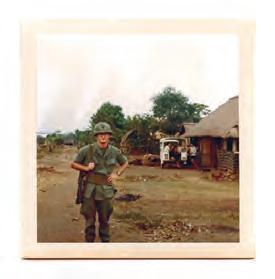
“This is our hometown, and we’ve never forgotten it,” echoed Marilyn at the event. “We couldn’t be happier.”
One need look no further than the walls of Bob’s office in the couple’s home in Pleasanton, California, to see how “authentically Scranton” they’ve remained since Bob studied accounting at Scranton through its ROTC program and Marilyn took University courses through a partnership with the then-Scranton State General Hospital School of Nursing.
Mementoes from their time at Scranton are placed prominently amidst some of the accolades Bob earned as president and CEO of The Cooper Companies Inc., a multinational manufacturer and marketer of contact lenses and specialty healthcare products, and his military honors (he earned two Bronze Stars and the Army Commendation Medal serving as a captain in the Army Medical Service Corps in Vietnam). One can see his 1968 Scranton diploma, the Frank J. O’Hara Distinguished Alumni Award bestowed upon him in 2008, a framed “Weiss 68” Scranton jersey presented to him at the opening of Robert and Marilyn Weiss Field (a key component of the Quinn Athletics Campus made possible in part by a $1 million gift from Bob and Marilyn), and a simple purple and white University of Scranton pennant one might find today in the campus bookstore.
Although everything in the office speaks volumes about Bob’s achievements and his personal disposition (the San Francisco Business Times does not bestow the title of “Most Admired CEO 2012” by accident), it is perhaps that last item, that simple
pennant, that holds the key to understanding the couple and their awe-inspiring support of the University and its students; to put it as simply as possible, Bob and Marilyn may have physically left Scranton a lifetime ago, but Scranton has spiritually never, ever left their hearts.
“I love what Scranton did for me,” Bob said. “I owe what I have to what I learned there, pure and simple.”
Bob grew up in Lake Ariel and spent time in the Scranton area visiting his “50 or 60 first cousins” who lived throughout the Lackawanna valley. He loved math and initially wanted to pursue a career as a civil engineer, although he also thought he might like to attend a military academy. Ultimately, he decided Scranton’s ROTC program would be a good fit, and he became the first person in his family to attend college when he began commuting to the University in the fall of 1964.
At Scranton, Bob decided to change gears and study accounting, which he loved, especially the courses taught by legendary Scranton professor John P. McLean ’40. Somewhat surprisingly, though, he found he enjoyed his philosophy classes with the Rev. Edward Gannon, S.J., H ’83 even more, given their focus on morality and ethics.
“(If) I were to pick two or three people who changed my life the most, Father Gannon would be on that list,” he said of the late professor. “I kind of adopted who I am from what I learned in philosophy.
“How you do business, and how you conduct yourself, is all about — and we don’t use these terms enough these days — morality and ethics.”
In 1966, Bob met Marilyn, a student at Scranton Central High School, when she snuck into that “U Dance.” Shortly after, Marilyn began studying to be a nurse at the Scranton State General Hospital School of Nursing, which inspired Bob to choose to serve in the Army Medical Service Corps.
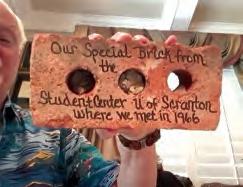


Bob graduated with a degree in accounting and began an internship at Peat Marwick (one of the firms that later merged into KPMG) in New York City. Soon afterward, he went to Vietnam, where he served with distinction. He married Marilyn in Hawaii in October of 1970, one month before he left active duty for a three-year stint in the Army Reserves. Marilyn then began working as a nurse (and later, head nurse) at the Edward S. Harkness Eye Institute at Columbia Presbyterian Medical Center in New York City, where she treated thousands of patients with impaired vision. Bob became a certified public accountant with a client base that included JC Penney, the Archdiocese of New York, and, in 1973, a company called Cooper Laboratories Inc. that would eventually become Bob’s professional home for the bulk of his career.
In 1975, the couple had their first child, Chris, and Marilyn decided to leave her job to focus on raising their family. Bob began working for Cooper full time in 1977 as an assistant corporate controller, and the couple soon welcomed two more children, Kim and Doug, to the world. Given Bob’s expertise in accounting and his experience as a medical supplies administrator, he rose quickly at Cooper, and the family moved to Pleasanton, California, in 1979 in advance of Cooper’s relocation to a new headquarters in Palo Alto. Over the years, Bob was promoted to corporate controller, treasurer, chief financial officer, chief operating officer, president of CooperVision, and, ultimately, president and CEO of The Cooper Companies. During Bob’s time at the company, Cooper had a number of industry-defining breakthroughs, including the development of intraocular lenses (i.e., lenses implanted directly into the eye), and Lasik surgery, two advancements that have helped millions see more clearly. As president and CEO, Bob championed a number of employee wellness programs, and he was recognized with the Albert Nelson Marquis Lifetime Achievement Award for 2017-2018.
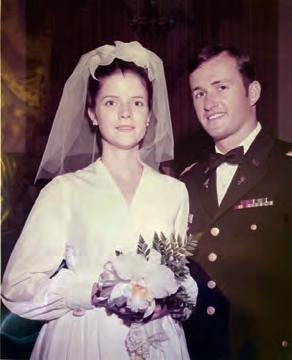
“My belief was that our employees … were our number one asset,” he said. “How you treat your employees and the wellness of those employees is what dictates how productive a company is, how productive our employees are.”
Since retiring in 2018, Bob has continued to serve Cooper as the chair of its board of directors. Once their children were older, Marilyn worked as a pediatric nurse for several years before she began volunteering with the Tri Valley Repertory Theatre in Pleasanton.
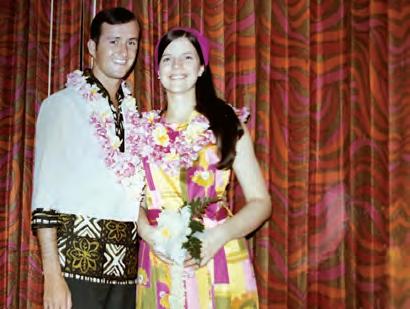
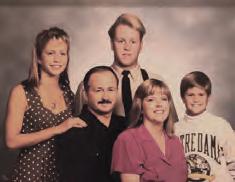
All the while, Bob and Marilyn kept their eyes open for opportunities to help others whenever they could. As a result, Bob became a sponsor of the Pediatric Refractive Error Training Center, an eyecare clinic in Hanoi, Vietnam, that trains optometrists to fight the growing epidemic of myopia, also known as nearsightedness, that has accompanied the increase in screentime the adoption of the smartphone accelerated.
In 2015, Bob and Marilyn found a way to combine their shared passion for helping others see more clearly with their love of the University and the greater Scranton area by making a $1.25 million gift to the University. The result: the creation of The Robert and Marilyn Weiss Pediatric Low Vision Research and Training Suite, a facility that provides free services to uninsured or underinsured residents of Lackawanna County. Bob joined the University’s Board of Trustees later that same year, and he quickly became informally known as “the pizza guru” by his fellow trustees due to his unabashed love of and enthusiasm for the pizza of Northeastern Pennsylvania. In 2018, the couple attended the official opening of Robert and Marilyn Weiss Field a few blocks away from the house where Marilyn grew up.
Over the course of the public phase of “A Fire That Kindles Other Fires: The Campaign For Mission, Access, & Excellence,” the University’s in-progress, $135 million capital campaign, Rev. Joseph G. Marina, S.J., University president, often joked that “for a mere, meager, eight-figure gift, you can have your name emblazoned upon” the University’s new center for workforce development, applied research and outreach.
“That line has fallen flat every single time that I have given it,” Father Marina said at the Weiss Hall naming announcement. “But it went differently in San Francisco on March 6, when, after the alumni reception, at the end of it as he was leaving, Bob Weiss turned to me and said, ‘If you’re serious about the opportunity to name the building, I’d like to hear more.’”
“How you do business, and how you conduct yourself, is all about and we don’t use these terms enough these days —morality and ethics.”
— Robert S. Weiss ’68
And, just like that, the farm boy and the city girl found themselves making the largest donation in the history of the University, a lasting testament to their shared vision for a better tomorrow.
At the close of the naming announcement, Bob remarked upon the outsized impact he and his classmates, including the late University benefactor John E. “Jack” Brennan ’68, P’06 and Edward R. Leahy, Esq. ’68, H’01 (who, along with his wife, Patricia Leahy, held the previous record for the largest single-donation gift in University history with their monumental $10 million donation), have had upon Scranton in an effort to inspire current and future Royals to do even more for their beloved University.
“The Class of ’68 has really stepped up,” he said. “You only have to look here at Brennan Hall — John Brennan, Class of ’68. Look across the way at Leahy Hall — Ed Leahy, Class of ’68. And now, we’ll be able to look across the street at Weiss Hall, Class of ’68.
“I’m sure future students who graduate, future alumni, are gonna set the bar even higher.”
Ever the optimist, Bob elaborated further on his love for Scranton during a follow-up Zoom call a few weeks after the announcement.
“Scranton has a tremendous amount to offer, let alone the best pizza in the world,” he said with a smile. As he and Marilyn returned to viewing a live webcam feed showcasing Weiss Hall’s construction, he added, Scrantastically, “The best pizza is Alfredo’s.”
INSETS: 1: Bob Weiss’ entry in the 1968 Windhover yearbook. 2: Bob Weiss ’68 serves in the Army Medical Corps in Long Binh, Vietnam, in 1970. 3: Bob Weiss ’68 displays a brick taken from the Gunster Memorial Student Center commemorating the night he and Marilyn (Chesick) Weiss met at a “U Dance.”4: Bob ’68 and Marilyn Weiss in 2024. 5: A photo of Marilyn Weiss taken to mark her graduation from the Scranton State General Hospital School of Nursing. 6: Bob ’68 and Marilyn Weiss celebrate their wedding day on Oahu, Hawaii, in 1970. 7: Bob’68 and Marilyn Weiss enjoy their honeymoon on Oahu, Hawaii, in 1970. 8: Clockwise from left, Kim, Chris, Doug, Marilyn and Bob ’68 Weiss pose for a family portrait in 1992.




William L. Kovacs ’69, Great Falls, Virginia, published his third book, Devolution of Power: Rolling Back the Federal State to Preserve the Republic. It provides a roadmap to unwinding the massive accumulation of federal power by devolving most domestic functions to the states, creating a more accountable and efficient government. His first book, Reform the Kakistocracy, Rule by the Least Able or Least Principled Citizens, was awarded the 2021 Independent Press Award for Social/Political Change. His books are available online and wherever books are sold.
Ernest Kollra ’75, Plantation, Florida, was reelected to another six-year term as circuit court judge for the 17th judicial circuit in Broward County, Florida. He will be presiding in Fort Lauderdale in the felony division.
Alvin J. Berlot, D.O. ’80, Moscow, was recently awarded clinical associate professorship in the Department of Emergency Medicine at the Philadelphia College of Osteopathic Medicine.

Melinda C. Ghilardi ’80, Dunmore, was recently appointed to the Governor’s Judicial Advisory Commission by Governor Josh Shapiro. The Judicial Advisory Commission advises the governor on judicial appointments in the Commonwealth of Pennsylvania. Ghilardi, a trial lawyer at Munley Law, also recently co-moderated the criminal panel of the Federal Practice Institute, sponsored by the Pennsylvania Bar Institute, the Continuing Legal Education arm of the Pennsylvania Bar Association.
Michael Griffin ’81, Colton, New York, and his wife Nancy are the recipients of the 2022-2023 Canton-Potsdam Hospital Board of Directors Community Service Award. The award is the highest honor bestowed by the hospital board and is given to individuals or organizations that have improved the health of communities in the region.
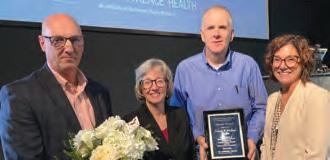
Class Notes included in this edition were submitted prior to June 7, 2024. To submit your own news or see additional class notes, visit scranton.edu/classnotes

Michael Banas, M.D. ’83, Dallas, recently published his 10th novel in the medical mystery genre titled Saving Chopin, a modernday medical examination of Polish composer Fryderyk Chopin.
Peter Butera ’83, Harveys Lake, and his team, The Butera Jordan Bender Hendricks group of Janney Montgomery Scott, were named to the Forbes 2024 Best-In-State Wealth Management Teams list. The ranking was developed by SHOOK Research and takes into account client retention, experience, AUM (Assets Under Management) and several other factors.

Marion Munley ’83, Moosic, of Munley Law Personal Injury Attorneys, was awarded the 2023 “Mel Award” by the Melvin M. Belli Society. The Mel Award is given to an attorney “who made a significant contribution to the practice of trial law in America.” The Melvin M. Belli Society is an international group of trial lawyers dedicated to preserving and enhancing the Belli legal legacy of promoting courtroom excellence. Munley is the past president of the Society. Munley also recently presented at the American Association of Justice’s Truck Litigation Group Members Only Meeting in Florida on “Rule of 3.”
Frank R. DiMaio, M.D. ’84, Old Brookville, New York, has been appointed as the inaugural chairman of the Musculoskeletal Service Line at Catholic Health in Melville, New York.
John C. Miller G’85, Fairfield, Iowa, and his wife Vina, returned recently from an experience to help propagate peace initiatives throughout the world. This 15-day event was hosted by the TM (Transcendental Meditation) group at an ashram in India (Kanha) near Hyderabad. It was attended by 11,000 people from 139 countries.
John. E. Little ’86, Virginia Beach, Virginia, is in his 12th and final year on the Board of the College of William & Mary, where he and his wife, Marianne, were recently named honorary alumni. John Little currently serves as Virginia’s Secretary of Health and Human Resources, overseeing 12 state agencies and leading a major effort to transform the state’s behavioral health system.
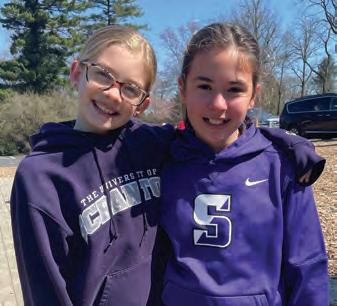
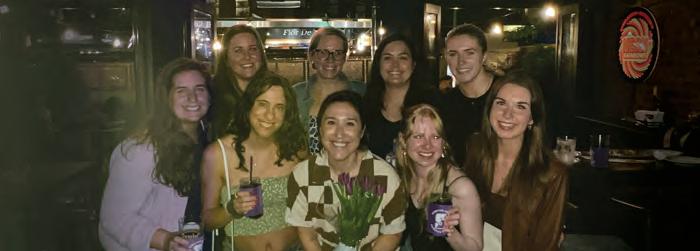
James G. Cain, M.D., FASA, FAAP, DABA ’87, Daytona Beach Shores, Florida, is now department chair and professor of Anesthesiology at the University of Florida College of Medicine Jacksonville. Cain also serves as the president of the national Trauma Anesthesiology Society.
Scott R. Antoine, D.O. ’89, Carmel, Indiana, published an Amazon best-seller called The Comprehensive Physician’s Guide to the Management of PANS and PANDAS, which is a medical textbook outlining his approach to the treatment of children with post-infectious autoimmune encephalitis. This textbook has established the standard of care in the management of these disorders.

Lisa Witowski Shearman ’89, Lansdale, a principal in the firm Hamburg, Rubin, Mullin, Maxwell and Lupin PC, was a speaker at the Philadelphia Bar Institute’s Estate Law Institute. Shearman presented on “411 on 911: POLST (Portable Medical Orders), Healthcare Power of Attorneys (POAs) & Living Wills.” She was also recently elected president of the Montgomery Bar Association, where she serves as its eighth woman president and its 139th president and has been included in the 2024 Pennsylvania Super Lawyers list in the areas of Estate & Probate. Each year, no more than five percent of the lawyers in the state are selected by the research team at Super Lawyers to receive this honor.
James P. McGraw III, DMSc, MPAS, PA ’90, Peachtree City, Georgia, has been selected by the Best in Georgia Magazine as one of the top doctors in the state for 2024.
Kathryn “Kate” Coviello Cacciamani ’91, Philadelphia, was named as a member of the newly created Pennsylvania Indigent Defense Advisory Committee (IDAC) by Speaker of the Pennsylvania House of Representatives Joanna McClinton. Cacciamani is serving as vice-chair of IDAC.

Christen Gilmore Pionzio ’91, Doylestown, a principal of the firm Hamburg, Rubin, Mullin, Maxwell & Lupin, was listed in the 2024 edition of The Best Lawyers in America for Land and Zoning law. She was also included in the 2024 Pennsylvania Super Lawyers list in the area of real estate. Each year, no more than five percent of the lawyers in the state are selected by the research team at Super Lawyers to receive this honor.
Tricia Richards-Service, Ph.D. G’91, Clarks Summit, received the Part-time Faculty Excellence in Teaching and Instruction Award. She is an adjunct assistant professor in the Klein College of Media and Communication, Advertising and Public Relations.
Peter Stockschlaeder ’91, Potomac, Maryland, currently works for GRSi, a subsidiary of DLH Corporation, as a project manager and the Mac Engineering team lead on the company’s contract at the National Institute of Mental Health in Rockville, MD. He is a recipient of the 2023 NIMH Director’s Award as part of the IT Data Center Engineering Team’s contributions to enhancing technology service delivery at the agency.
Eric D. Brophy ’92, Wall, New Jersey, was named to the ROI Influencers Power List: 2024 Economic Development. Brophy is the executive chief of staff for economic growth in the Governor of New Jersey’s Office.
Donna Stefans ’93, Dix Hills, New York, founder & lead attorney at Stefans Law Group, PC, an estate planning and elder law firm, has been added to the National Academy of Elder Law Attorneys (NAELA), New York Chapter Board of Directors. NAELA is a community of attorneys who specialize in handling legal issues affecting people as they age and those with special needs. NAELA believes in the importance of continuing legal education, advocacy, and examining public policy issues in our mission to enhance the quality of life for older adults and persons with disabilities.
Jim McNulty ’96, Gaithersburg, Maryland, was elected vice president of the Gaithersburg City Council for the 2024 legislative year. Gaithersburg is Maryland’s third largest city, with a population of just under 70,000 people. McNulty is entering the third year of his first four-year term on the Council.
Vincent Galko G’99, Roaring Brook Township, senior vice president for Mercury Public Affairs, was recently recognized by City & State Pennsylvania among its 2023 Fifty over 50 most influential difference makers.

Suzanne Messina Messer ’01, Cicero, New York, has assumed the position of deputy managing member in the Syracuse office of Bond, Schoeneck & King.
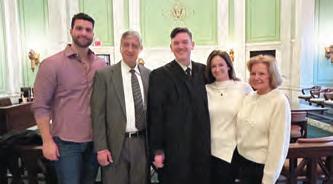
Daniel J. DeSalvo ’02, Bayonne, New Jersey, was appointed by Governor Phil Murphy and sworn in as a judge of the Superior Court of New Jersey in February.
Dale J. Bauman ’04, Buffalo, New York, an attorney, was named senior partner at Lipsitz Green Scime Cambria, LLP. Bauman practices civil litigation in New York and Florida.
Rev. Mark R. Searles ’08, Easton, was appointed to the faculty of St. Charles Borromeo Seminary in the Archdiocese of Philadelphia and will work in the college division at the seminary’s new campus in Lower Gwynedd Township.
Ashley E. Teatum ’09, Durham, North Carolina, was named to the Association of Proposal Management Professionals 40 under 40 list for 2023. This list features proposal management professionals noted for winning big, giving back to their communities and going above and beyond in positioning their teams for success.
Shohin Vance ’11, Philadelphia, has been named a partner with the firm Kleinbard, effective January 1, 2024. Vance is a partner in the Litigation Department and will continue to support the Government Relations and Political Law Groups; he will focus his practice on appellate litigation, litigation involving governmental entities and officials, state and federal Constitutional matters, and grand jury investigations.
Milestones continued

Wesley Meehan ’14, Philadelphia, has joined Fox Rothschild in the Blue Bell office as an associate in the Labor & Employment Department.
Christopher Kwock ’16, Somerset, New Jersey, received his PharmD from College of Pharmacy at University of the Sciences on May 25, 2022. He is currently managing a CVS pharmacy in Philadelphia, PA.
Adriana Nurkiewicz ’14 to Andrew Webber
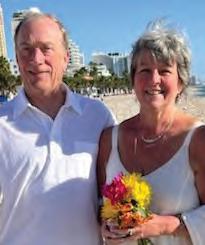
Cynthia Buchman G’17, Orefield, vice president of strategic planning and operation services at Good Shepherd Rehabilitation, was named the recipient of the Lee/Haney Award for Senior Leadership by ACHE of Eastern Pennsylvania.
Lauren Kwock ’17, Somerset, New Jersey, received her Doctor of Veterinary Medicine (DVM) from College of Veterinary Science at Lincoln Memorial University on May 22, 2021. She is currently practicing in Iselin, New Jersey.
Abigail Corrigan ’21, Philadelphia, ran in the Boston marathon women’s division, where she finished in 27th place overall and was the 8th American finisher out of more than 10,900 female runners.
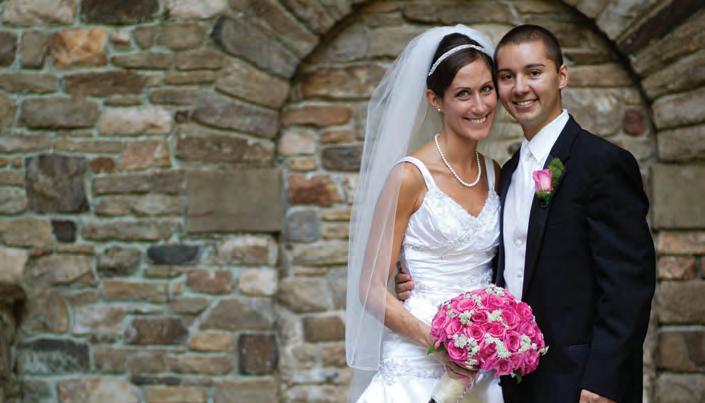
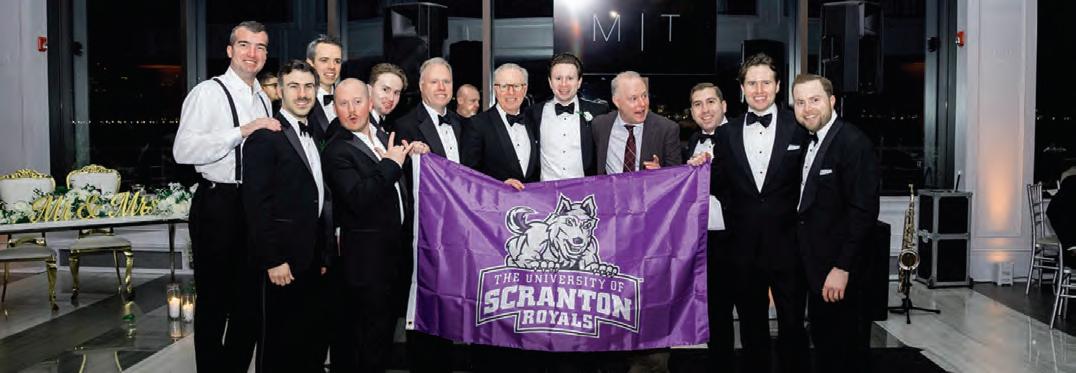


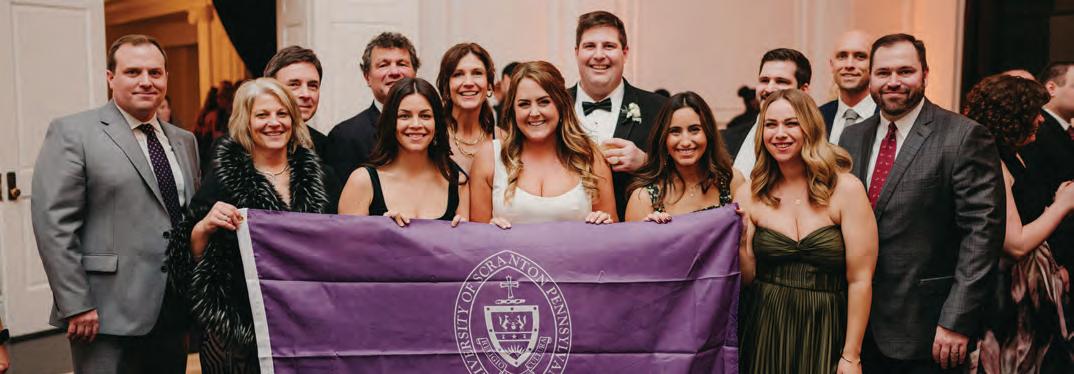

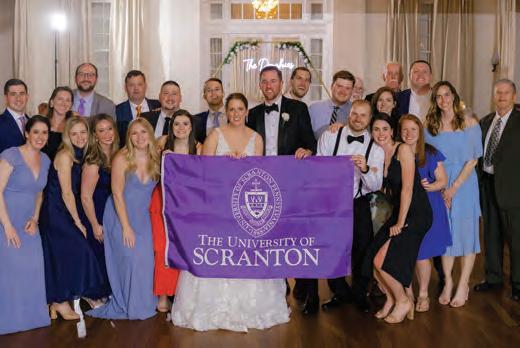

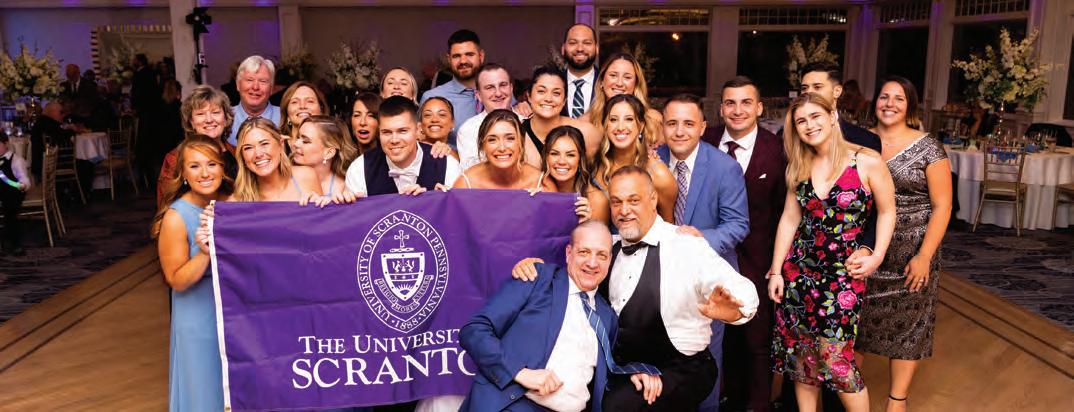
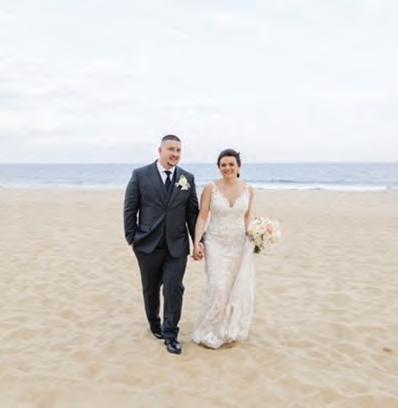


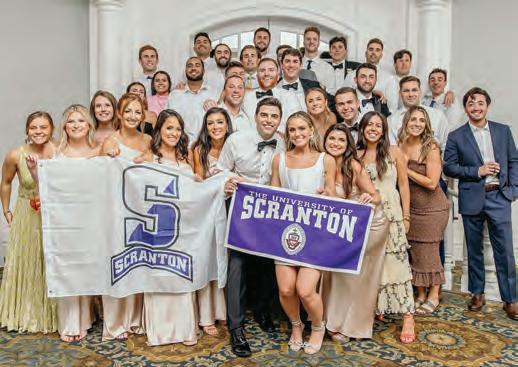
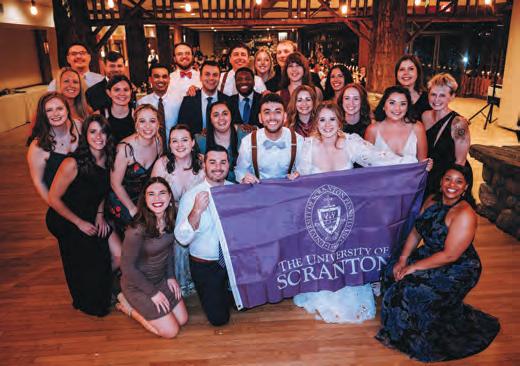



A daughter, Arden, to Gabrielle Pierce ’14, DPT’17, Doylestown 1
A daughter, Adelaide Sorace, to Kim Sorace ’16 and Eddie Sorace ’14 2
A daughter, Grace Vito, to Kaitlyn Vito ’16 and Kyle Vito ’14 3
A daughter, Olivia Rose, to Bridget and Matthew Tirella ’09 4
A son, Gio, to Stephen ’12 and Sarah Phillips Fernando ’12, Dunmore 5
A son, Ellis Mishko, to Dennis Mishko ’12 and Kathleen Lavelle ’12, New York City 6
A daughter, Chelsea Ann, to Sean and Maribeth Castaldi Baress ’14, Scranton 7
A daughter, Harper Emilia, to Christopher and Alexa Winchel D’Antonio ’17, G’18, Brooklyn, New York 8
A daughter, Lucia Rose, to Alex ’18 and Sara Rizzo Wolan ’18, G’19 9


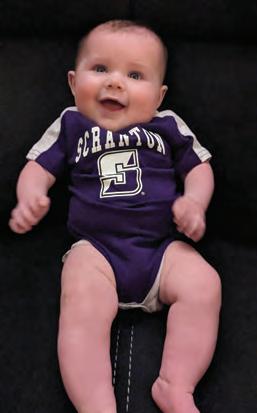


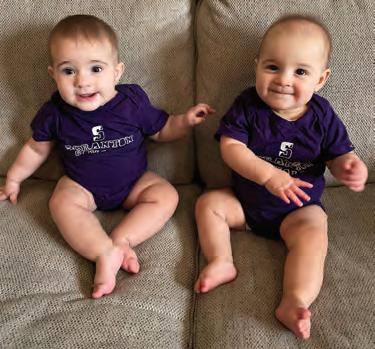


“Eternal rest grant unto them, Lord, and let perpetual light shine upon them. May the souls of the faithful departed rest in peace.”
Jack S. Gorelick, Ph.D. ’41, Brooklyn, New York
LTC. Ralph A. DiSanto, USA, Ret. ’48, Deerfield Beach, Florida
John M. Kennedy ’50, Framingham, Massachusetts
Andrew Yurkanin ’50, Mountaintop
Robert J. Murray ’51, Greensboro, North Carolina
Eugene Talerico Sr. ’51, Old Forge
Rev. William D. Campbell, Ph.D. ’52, Wilkes-Barre
Walter J. Golkiewicz Jr. ’53, Corning, New York
Raymond P. Ardoline ’55, Alexandria, Virginia
John S. Glooch ’55, Camp Hill
Louis A. Naglak ’55, Doylestown
William F. Cawley ’56, Sarasota, Florida
Andrew A. Fioriti ’56, Jacksonville, Florida
John J. Capone ’57, Indianapolis, Indiana
Hon. Anthony F. Mantione ’57, Harrisburg
Donald J. Booth ’58, Waverly Township
Michael Labonich ’58, Jermyn
Robert J. Sylvester ’58, Clarks Summit
William G. Connolly ’59, Garwood, New Jersey
Edward D. Kazakavich ’59, Bedford, New Hampshire
William C. O’Malley ’59, Fernandina Beach, Florida
Anthony C. Romeo ’59, Washington, D.C.
William J. Young ’59, South Abington Township
Jerome Block ’60, Allentown
Joseph P. McGraw ’60, Mount Laurel, New Jersey
Joseph E. Stachnick ’60, Covington Township
Paul F. Crowley ’61, Harrisburg
John J. Marcinkevicz Jr. ’61, Vista, California
Thomas J. Mizianty, M.D., Ph.D. ’61, Waymart
Paul Rusincovitch ‘61, G’67, G’72, Taylor
David D. Evans ’62, Milburn, New Jersey
James J. Farrell ’62, Metuchen, New Jersey
Patrick D. McNelis ’62, Washington, D.C.
John J. Mecca, M.D. ’62, Allentown
Francis A. O’Bell ’62, Peckville
Jack E. Cisney ’63, Benwood, West Virginia
Gerald N. Dougherty ’63, York
James G. McHale ’63, Cambridge, Nebraska
James P. Noone, M.D. ’63, Auburndale, Florida
Joseph L. Spear ’63, Annville
Angelo J. Vergnetti ’63, Scottsdale, Arizona
Michael C. Egan, M.D. ’64, Bellevue, Washington
Earl B. Allison ’65, Seminole, Florida
William E. Barrett ’65, Rehoboth Beach, Delaware
Joan Weiss McDonald, sister of Joseph F. Weiss, Ph.D. ’61
Joseph D. Ceccoli, Sr. ’65, Levittown
William J. Kane, M.D. ’65, Greensboro, North Carolina
Edward J. Robson ’65, G’68, Clarks Summit
Leo E. Solomon G’65, Wilkes-Barre
James Patrick D’Iorio, M.D. ’66 Forty Fort
Thomas E. Shoener ’66, Scranton
Gerard J. Hyland ’67, Durham, North Carolina
Frederick B. Morrison ’67, Morrisville
Judith Chiampi Barone G’68, West Pittston
Virginia Serino G’68, Pittston
Joseph C. Andraski ’69, Bensalem
John R. Burns, Ed.D. ’69, Philadelphia
Louis T. Corbett ’69, Seattle, Washington
James J. Deice ’69, Pittston
Robert T. Gownley Jr. ’69, Scranton
Francis J. Smaka G’69, Dallas
Bernardine DePietro G’71, Peckville
Mary T. Lupien McCabe G’71, Wilkes-Barre
Carolann G. Puk G’71, Kingston
James F. Strome, Ed.D. G’71, Ocala, Florida
Richard J. Brust ’72, Scranton
Marlin C. Evans ’72, Bangor
James P. Mecca ’72, Dunmore
James C. Barrett ’73, Clarks Summit
Joseph G. Cherochak ’73 Florence, South Carolina
John S. Cortese ’73, Charlotte, North Carolina
Ronald G. Davis G’73, Fort Myers, Florida
Phillip S. Froncek ’73, Brodheadsville
James J. Garibaldi ’73, Chatham, New Jersey
Leonard J. Nawrocki ’73, Covington Township
William T. Taylor ’73, Lansdowne
Peter Erickson ’74, Clarks Summit
John B. Kelly ’74, Drexel Hill
Michael O. O’Boyle ’74, Scranton
Michael F. Rodgers G ’74, Fairfax, Virginia
Joseph F. Capalong, D.M.D. ’75, Dunmore
John J. Cipriano, M.D. ’75, Dunmore
Robert K. Davis ’75, Scranton
Thomas F. Moran ’75, Clarks Summit
Michael J. O’Malley ’75, Tamaqua
Teresa Joseph Drogalis ’77, Duryea
Stephen F. Durkin ’77, Carbondale
Craig N. Peterson ’77, Harrisonburg, Virginia
Nicholas J. Punko G’77, Wilkes-Barre
John Schmidt Sr., father of Emilie Schmidt ’77, John Schmidt Jr. ’78 and Paul Schmidt ’80
Albert DiSantis, father of John DiSantis ’79
Harold J. “Mack” McCambridge, father of Mary M. McCambridge ’79
Sr. Elizabeth Szilvasi, MPF G’77, Watertown, New York
Rev. Joseph Clark ’80, Allendale, Virginia
Gregory G. Sereditch ’80, Scranton
Robert J. Lopatto ’81, Olyphant
Mary Lynn Garvey McHale ’81, Scranton
Mark C. Rostkowski ’81, Duryea
Elaine M. Herrick, M.D. ’82, Yonkers, New York
Ralph J. Riviello ’82, Dunmore
Robert A. Volpicelli ’82, Millis, Massachusetts
James P. Gregorowicz ’83, Springbrook Township
Annette Schmidlin Young G’83, Lakeville
David E. Allegrucci ’84, Buckeye, Arizona
Catherine Long Burke ’84, Dunmore
Timothy J. Corcoran ’84, Mount Holly, New Jersey
Jonathan Sever Moe G’84, Scranton
Sister Rae Ann Ohlinger G’84, Allentown
Mark A. Singer ’84, Hughestown
James M. Crawford ’87, Berkeley Heights, New Jersey
Ann M. McDonough G’87, Lake Worth, Florida
John C. Munshower, D.O. ’87, Wayne
Maryann T. Romano G’87, The Villages, Florida
Joseph J. Scochin ’87, Scott Township
Christopher A. Barbarevech, M.D. ’88, Moosic
Philip M. Gogarty IV ’88, Barnegat, New Jersey
Donna Robachinski Branco ’89, Montrose
John D. Cleary ’89, Neshanic Station, New Jersey
John E. Enders, Ph.D. G’89, Dalton
Jane Guss ’89, Chester
James H. Hambrose ’89, Easthampton, New Jersey
Maria E. Button G’90, Mountaintop
Diana Barber Githler ’90, Corning, New York
Todd L. Martin ’91, Corning, New York
Kenneth S. Fekete ’92, Chatham, New Jersey
Thomas A. Yocum ’92, North Abington Township
John A. Zaggi Jr. ’92, Greenwood, South Carolina
Julia Larioni Ludka ’97, G’98, South Abington Township
Catherine A. Conway G’03, Scranton
Moira R. Parkinson ‘12, Syracuse, New York
Todd T. Parry ’12, Peckville
John Kozlowski ’15, Huntington Station, New York
Allison M. Reynolds G’16, Hockessen, Delaware
Kyrsten “Kay” Belles ’22, Scranton
Louis E. DeVirgilis, father of Eric C. DeVirgilis ’86
Gloria Ann Cheslock, mother of Craig Lukatch ’00 and Loni (Lukatch) Cinoski ’02
Kathleen Warrick, mother of Kimberly Warrick Mongiello ’05
Class Notes Publication Policy: The University of Scranton accepts submissions of news of professional achievements or personal milestones for inclusion in the Class Notes section of The Scranton Journal. Submissions can be submitted electronically to alumni@scranton.edu or by mail to Marge Gleason, Class Notes editor, The University of Scranton, 800 Linden Street, Scranton, PA 18510. Digital photos should be 300dpi, JPG or TIFF format and at least 3x5 inches. The University of Scranton reserves complete editorial rights to all content submitted for Class Notes, and posts and publishes listings in as timely a fashion as possible, as space permits. Reasonable steps are taken to verify the accuracy of the information submitted, but the University cannot guarantee the accuracy of all submissions. Publication of achievements or milestones does not constitute endorsement by The University of Scranton.
The University of Scranton is committed to providing a safe and nondiscriminatory employment and educational environment. The University does not discriminate on the basis of race, color, creed, religion, ancestry, gender, sex, pregnancy and related conditions, sexual orientation, gender identity or expression, sex characteristics, sex stereotypes, age, disability, genetic information, national origin, ethnicity, family responsibilities, marital status, veteran or military status, citizenship status, or any other status protected by applicable law. Sexual harassment, including sexual violence, is a form of sex discrimination prohibited by Title IX of the Education Amendments of 1972. The University does not discriminate on the basis of sex in its educational, extracurricular, athletic, or other programs or in the context of employment. Inquiries regarding non-discrimination and sexual harassment and sexual misconduct policies may be directed to Elizabeth M. Garcia, executive director, Office of Equity and Diversity, 570.941.6645.

Gene Manning ’71 has heard it all. Literally.
Since getting his start on the air during his first year at The University of Scranton, Manning has worked as an FM radio account executive, an account executive/mid-day air personality for CBS Radio in Philadelphia, a part-time television weather/ sports anchor for CBS Television in Philadelphia, a production director, a general sales manager for FM and AM radio, a broadcast executive for the Associated Press, a voice-over talent, and as the president/CEO of Manning Broadcasting Inc., which currently owns and operates three radio stations in the greater Hagerstown-Frederick area of Maryland.
“I was always fascinated by radio,” Manning said.
While growing up in Lehighton, Manning enjoyed listening to the radio; something changed, however, when he visited New York City with his mother and took a tour of the famed WNBC studios, where he observed an air personality named Jim Lowe broadcasting from a studio.“I became a more astute listener,” Manning said. “I knew the voice on the radio was sitting in a studio as he was, and I was drawn to it.”
Manning attended high school at Devon Preparatory School, a place he credits with instilling his love of language.
“(Devon) understood that language was essential, and the better you speak the language, the better you understand it, the better you’ll do in life,” he said.
Veteran Broadcast Executive and Voice Talent Establishes Endowed Scholarship for Economics or Philosophy Majors
Upon arriving at the University prior to his first day of classes, Manning was trying to get his bearings by reading a campus map when a friendly priest asked him if he could help with anything.
“He was very kind, and very cordial, and very welcoming, and he pointed out a few things to me on the map,” Manning said.
“When I started college a few days later, (I learned) he was the president of the University! Father Aloysius Galvin, S.J.
“That was a very nice welcome to The University of Scranton.”
At Scranton, Manning moved into Casey Hall and struck up friendships with Rev. William J. Devlin, S.J., and Rev. Edward J. Gannon, S.J., H’83, who both resided there at the time.
“I loved Father Gannon,” Manning said. “He was a very positive force in my life. He really encouraged me, and he recognized things that I didn’t think were important, but he did.
“It made an impact.”
Manning knew he wanted to get involved with the University’s radio station, so he obtained an FCC license and began DJing at the station. He soon began broadcasting commercially at an AM station in nearby Wilkes-Barre, and, after graduation, began working at an FM station in Toledo, Ohio. In 1982, he purchased his first radio station, and the rest, as they say, is history. Since retiring, Manning has bred champion English springer spaniels that have competed in field trials throughout the nation. Today, Manning continues to use his audio skills as a voice-over talent for hire.
In the 1990s, Manning began supporting the work of Easterseals, America’s largest nonprofit health care organization, and he served on its national Board of Directors for six years.
“It was a really wonderful experience,” he said.
At the University, Manning recently established The Eugene J. Manning ’71 Endowed Scholarship with proceeds from the Eugene Manning Charitable Gift Annuity. The scholarship, once fully endowed, will benefit Royals majoring in philosophy or economics, ensuring that future students will benefit from the same Jesuit education he received more than half a century ago.
“It’s been a long time, but I wouldn’t change a thing about my time at Scranton,” he said. “I still have great memories.”

